Слайд 2
![Cycle [saikl] – кататься на велосипеде](/_ipx/f_webp&q_80&fit_contain&s_1440x1080/imagesDir/jpg/581422/slide-1.jpg)
Cycle [saikl] – кататься на велосипеде
Слайд 3
![Cycle [saikl] city - город велосипедов](/_ipx/f_webp&q_80&fit_contain&s_1440x1080/imagesDir/jpg/581422/slide-2.jpg)
Cycle [saikl] city - город велосипедов
Слайд 4

Слайд 5

Слайд 6
![Suburb [sʌbɜːb]- пригород](/_ipx/f_webp&q_80&fit_contain&s_1440x1080/imagesDir/jpg/581422/slide-5.jpg)
Suburb [sʌbɜːb]- пригород
Слайд 7
![Commute [kə’mju:t]- ездить далеко на работу](/_ipx/f_webp&q_80&fit_contain&s_1440x1080/imagesDir/jpg/581422/slide-6.jpg)
Commute [kə’mju:t]- ездить далеко на работу
Слайд 8

Слайд 9

Match the words with their meanings
Слайд 10
![1. Commuting [kə’mju:tiŋ] – долгие поездки на работу](/_ipx/f_webp&q_80&fit_contain&s_1440x1080/imagesDir/jpg/581422/slide-9.jpg)
1. Commuting [kə’mju:tiŋ] – долгие поездки на работу
Слайд 11

Слайд 12
![Commuting [kə’mju:tiŋ] – travelling to work every day (b)](/_ipx/f_webp&q_80&fit_contain&s_1440x1080/imagesDir/jpg/581422/slide-11.jpg)
Commuting [kə’mju:tiŋ] – travelling to work every day (b)
Слайд 13
![2. Suburbs [sʌbɜːbz] – пригороды](/_ipx/f_webp&q_80&fit_contain&s_1440x1080/imagesDir/jpg/581422/slide-12.jpg)
2. Suburbs [sʌbɜːbz] – пригороды
Слайд 14

Слайд 15
![Suburbs [sʌbɜːbz] – places around the city where people live (с)](/_ipx/f_webp&q_80&fit_contain&s_1440x1080/imagesDir/jpg/581422/slide-14.jpg)
Suburbs [sʌbɜːbz] – places around the city where people live (с)
Слайд 16

Слайд 17

Слайд 18

Park – leave a car somewhere (d)
Слайд 19
![4. Rush hour [auə]- час пик](/_ipx/f_webp&q_80&fit_contain&s_1440x1080/imagesDir/jpg/581422/slide-18.jpg)
4. Rush hour [auə]- час пик
Слайд 20

Слайд 21

Rush hour – the busiest time of day (с)
Слайд 22
![5. Crowded [kraudid]- переполненный](/_ipx/f_webp&q_80&fit_contain&s_1440x1080/imagesDir/jpg/581422/slide-21.jpg)
5. Crowded [kraudid]- переполненный
Слайд 23

Слайд 24

Crowded – full of people (a)
Слайд 25

Слайд 26

Match the photos with the captions
Слайд 27

1. A businessman travelling to a meeting
Слайд 28

Слайд 29

Слайд 30

A businessman travelling to a meeting
Слайд 31

2. Rush hour traffic in Jakarta
Слайд 32

Слайд 33

Слайд 34

2. Rush hour traffic in Jakarta
Слайд 35

Слайд 36

Слайд 37

Слайд 38

Слайд 39
![4. Commuting from the suburbs [sʌbɜːbz] into Tokyo](/_ipx/f_webp&q_80&fit_contain&s_1440x1080/imagesDir/jpg/581422/slide-38.jpg)
4. Commuting from the suburbs [sʌbɜːbz] into Tokyo
Слайд 40

Слайд 41

Слайд 42
![4. Commuting from the suburbs [sʌbɜːbz] into Tokyo](/_ipx/f_webp&q_80&fit_contain&s_1440x1080/imagesDir/jpg/581422/slide-41.jpg)
4. Commuting from the suburbs [sʌbɜːbz] into Tokyo
Слайд 43

Find these forms of transport in the photos
Слайд 44
![Bicycle [baisikl] Bike](/_ipx/f_webp&q_80&fit_contain&s_1440x1080/imagesDir/jpg/581422/slide-43.jpg)
Слайд 45

Слайд 46

Слайд 47

Слайд 48

Слайд 49

Слайд 50

Слайд 51

Put the words from the box in the correct column(s)
Слайд 52

Слайд 53

Слайд 54

How did you travel to work?
(by car, by bus, by train,
by metro or on foot?)
Слайд 55

Слайд 56

Match the forms of transport with the famous places
Слайд 57

Слайд 58

Слайд 59

Слайд 60

Слайд 61

Слайд 62

Слайд 63

2. Yellow taxis – New York
Слайд 64

Слайд 65

Слайд 66

Слайд 67

Слайд 68

Слайд 69

4. High speed trains – Tokyo
Слайд 70

Слайд 71

Слайд 72

5. Electric trams – San Francisco
Слайд 73

Слайд 74

Слайд 75

Слайд 76

Слайд 77

Read the text on page 100
Слайд 78

Before you read about Fatima
Слайд 79

Patriarca in the east of Sao Paulo
Слайд 80

Слайд 81

Слайд 82

Fatima da Costa lives in Patriarca, a suburb in the east
of Sao Paulo, Brazil. She works in the center of the city near Praca da Republica
Слайд 83

Every day Fatima takes an underground train to work in the
morning and back home in the evening
Слайд 84

She thinks travelling on the Sao Paulo underground system- the Metro
– is quick and convenient [kən’viniənt]
Слайд 85
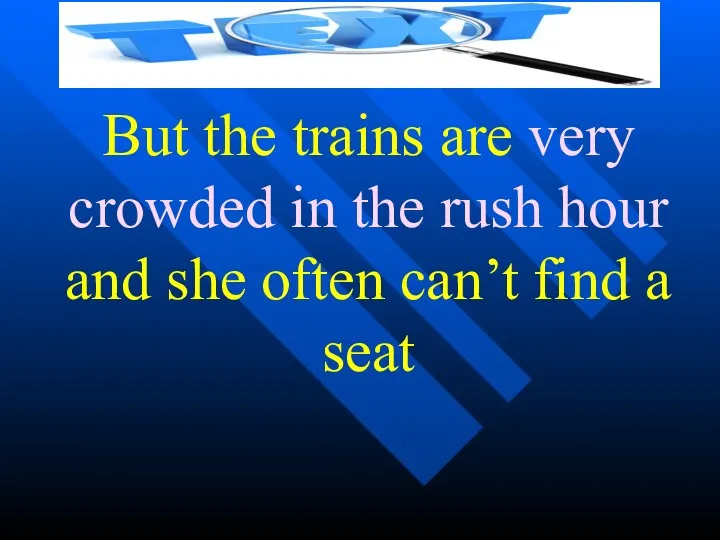
But the trains are very crowded in the rush hour and
she often can’t find a seat
Слайд 86

Complete the table for Fatima
Слайд 87
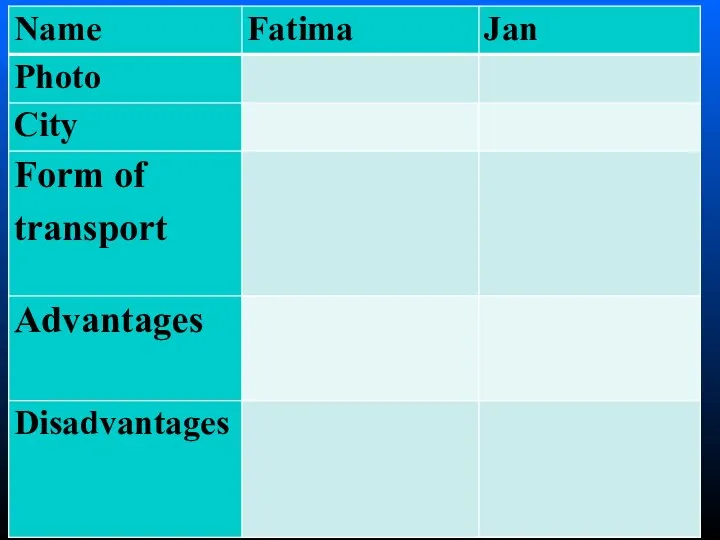
Слайд 88
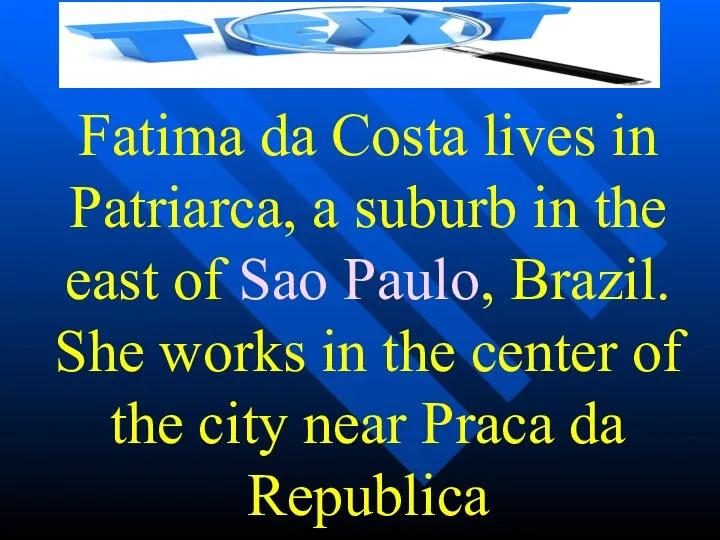
Fatima da Costa lives in Patriarca, a suburb in the east
of Sao Paulo, Brazil. She works in the center of the city near Praca da Republica
Слайд 89
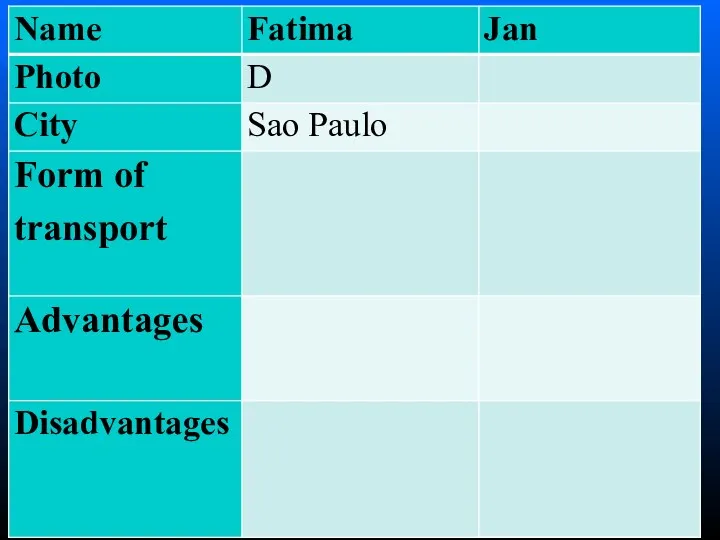
Слайд 90
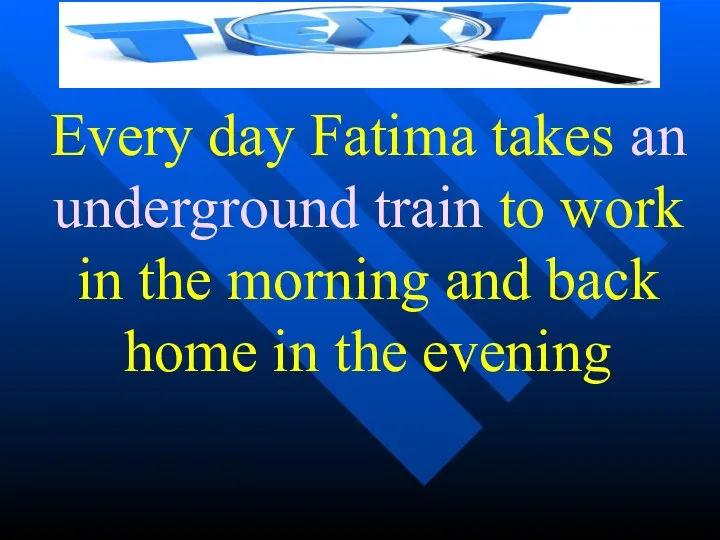
Every day Fatima takes an underground train to work in the
morning and back home in the evening
Слайд 91
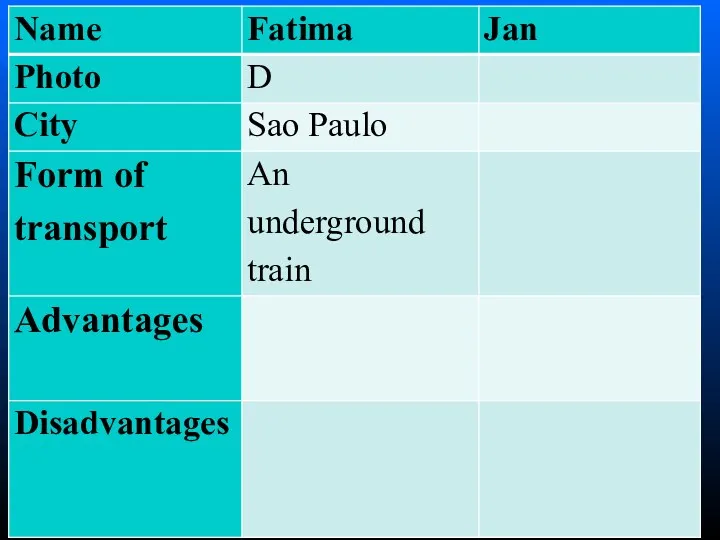
Слайд 92
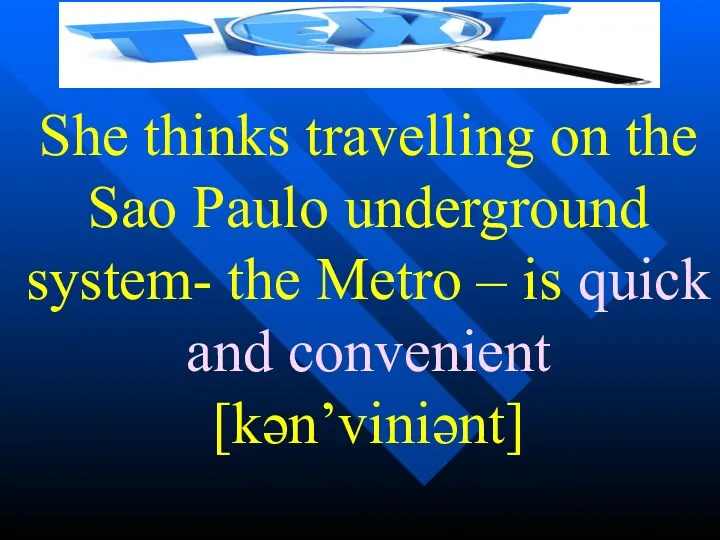
She thinks travelling on the Sao Paulo underground system- the Metro
– is quick and convenient [kən’viniənt]
Слайд 93
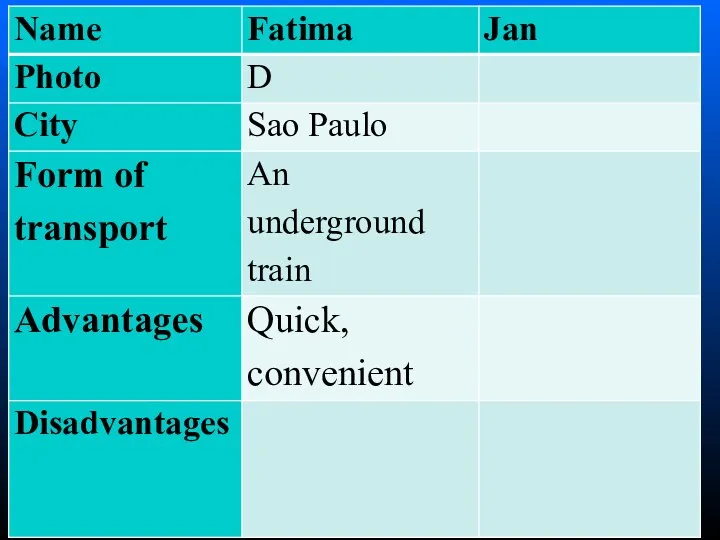
Слайд 94
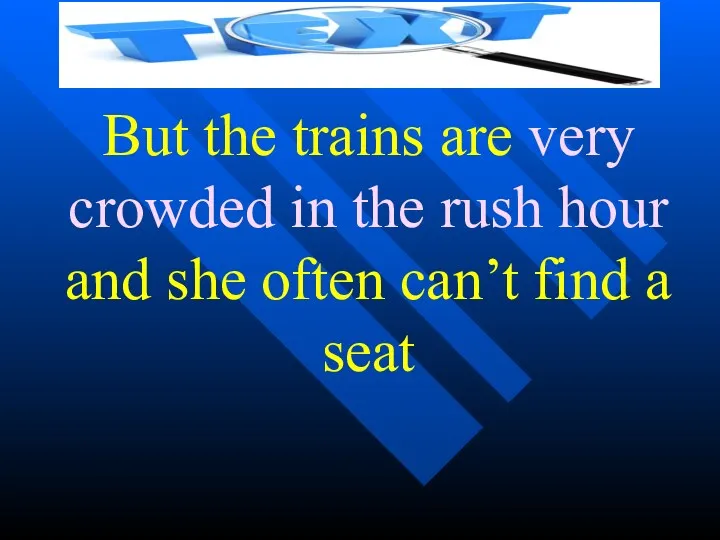
But the trains are very crowded in the rush hour and
she often can’t find a seat
Слайд 95
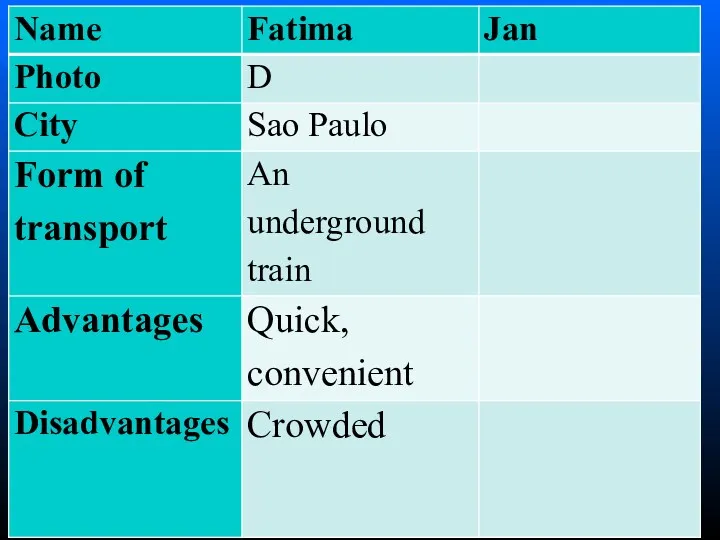
Слайд 96

Before you read about Jan
Слайд 97
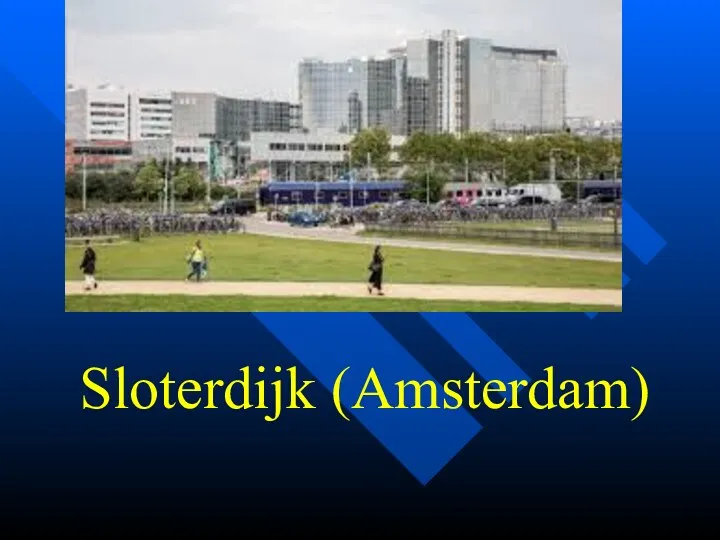
Слайд 98

Слайд 99
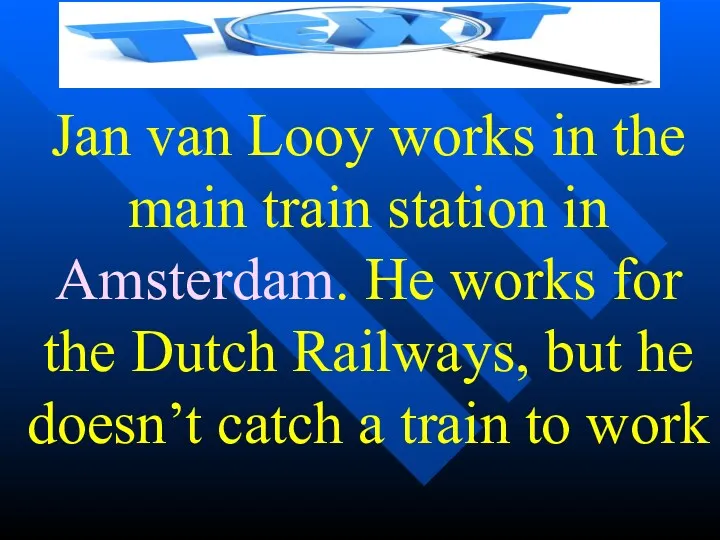
Jan van Looy works in the main train station in Amsterdam.
He works for the Dutch Railways, but he doesn’t catch a train to work
Слайд 100
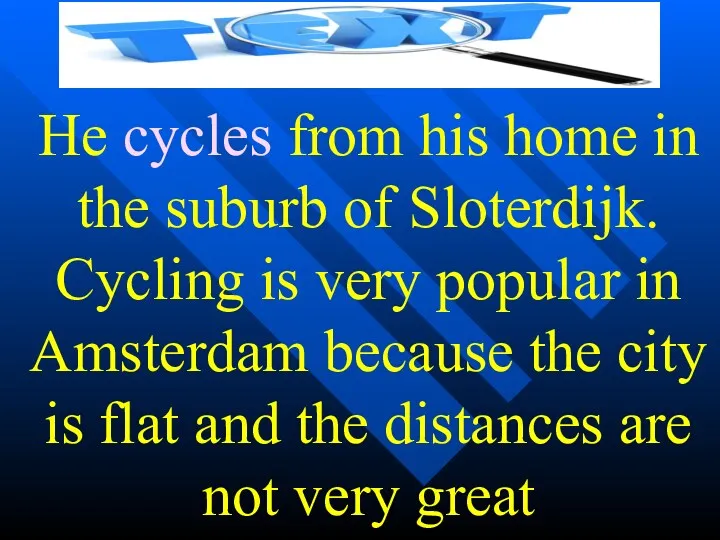
He cycles from his home in the suburb of Sloterdijk. Cycling
is very popular in Amsterdam because the city is flat and the distances are not very great
Слайд 101
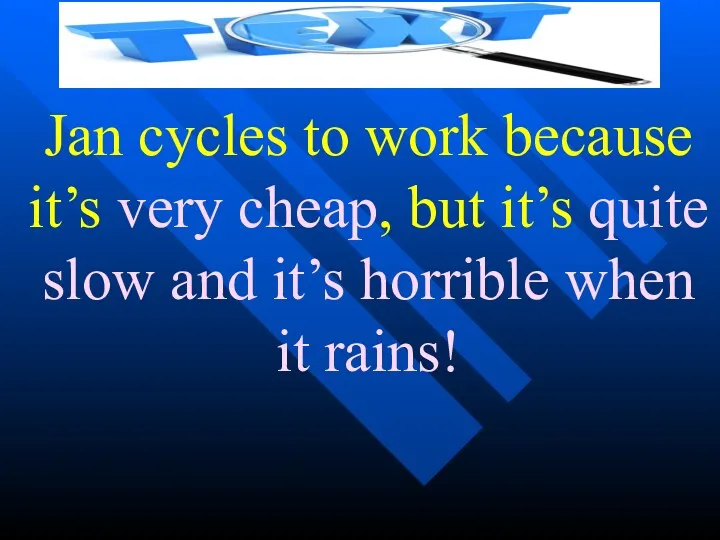
Jan cycles to work because it’s very cheap, but it’s quite
slow and it’s horrible when it rains!
Слайд 102
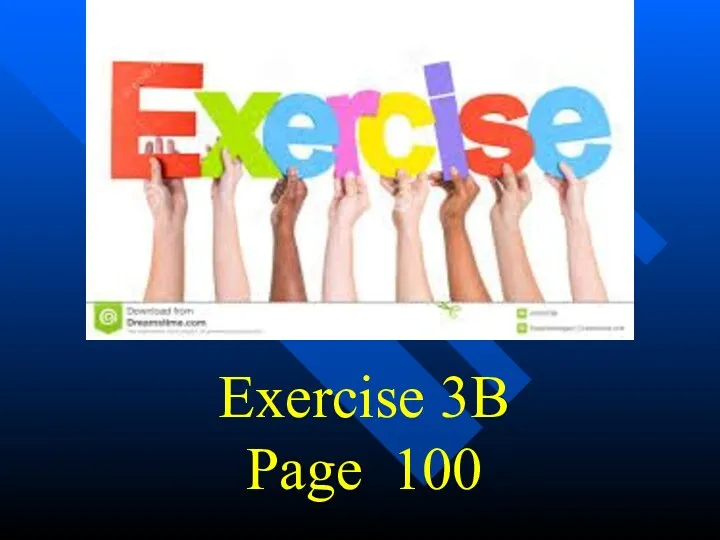
Слайд 103
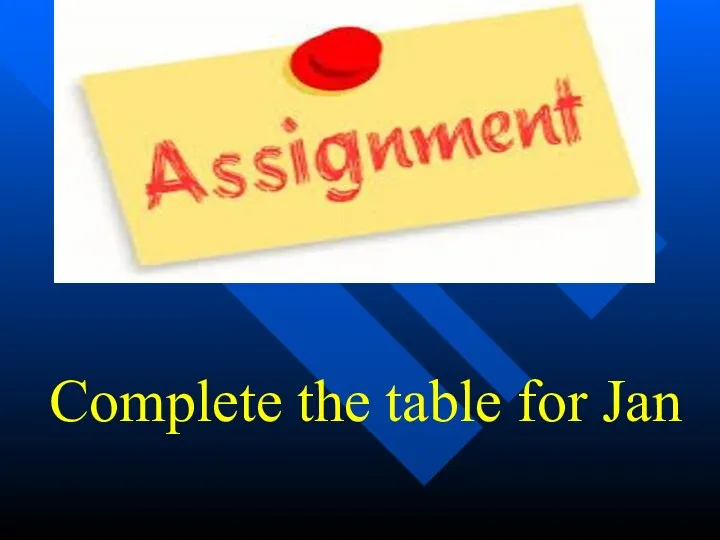
Complete the table for Jan
Слайд 104
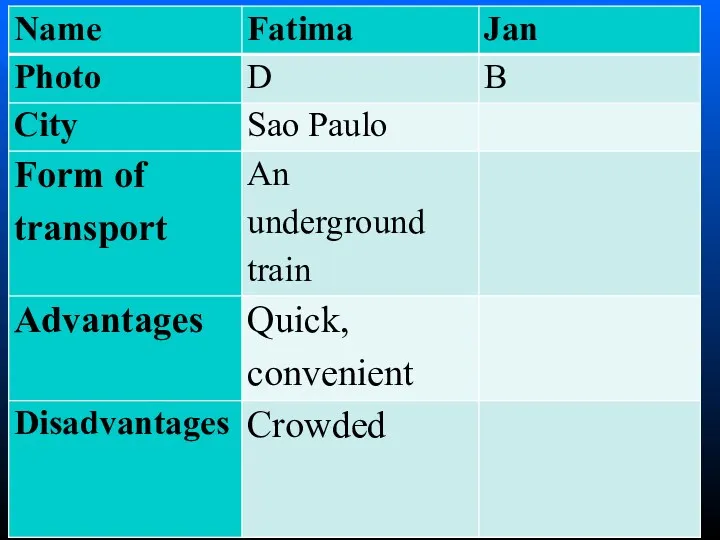
Слайд 105
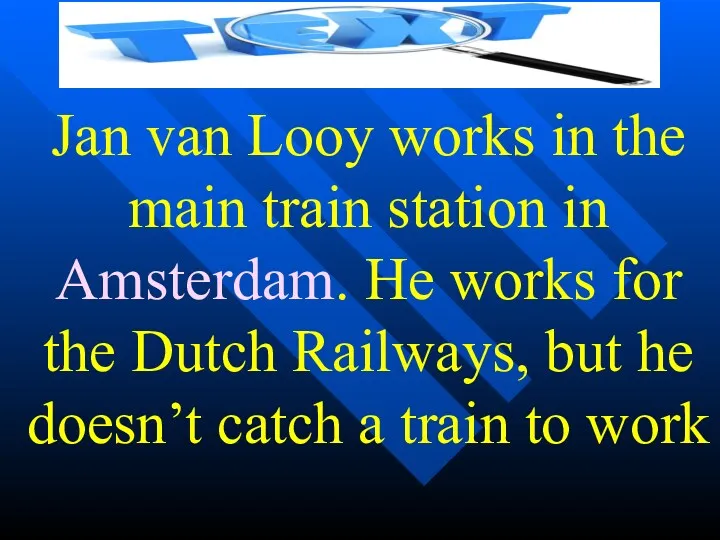
Jan van Looy works in the main train station in Amsterdam.
He works for the Dutch Railways, but he doesn’t catch a train to work
Слайд 106

Слайд 107
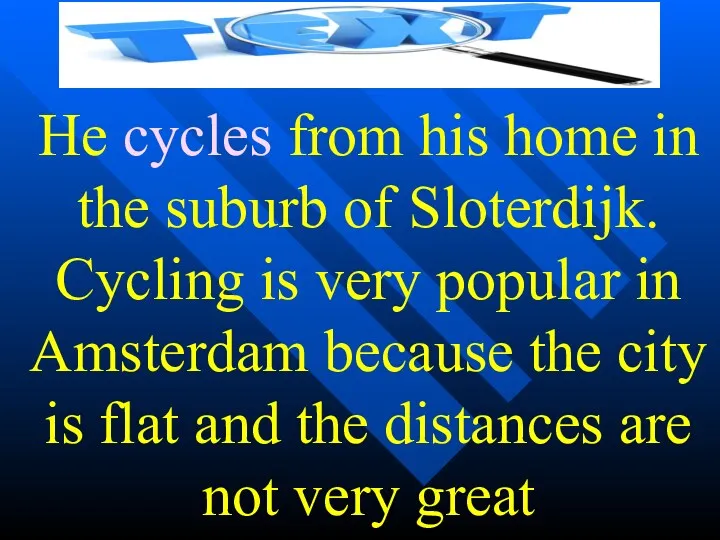
He cycles from his home in the suburb of Sloterdijk. Cycling
is very popular in Amsterdam because the city is flat and the distances are not very great
Слайд 108
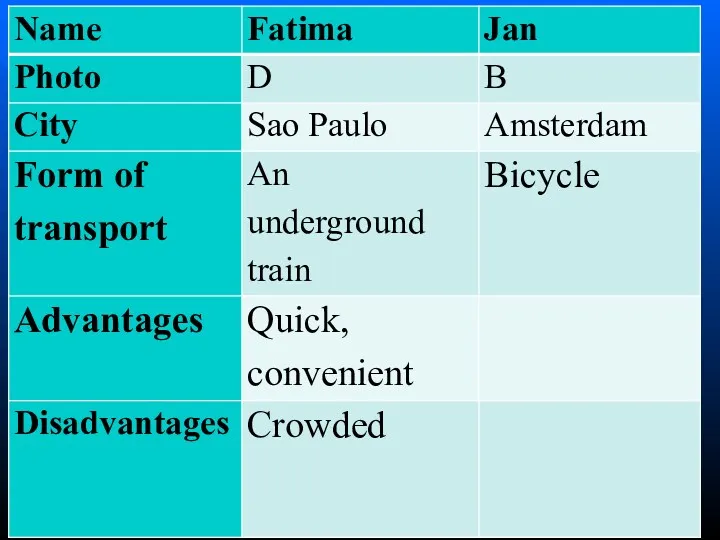
Слайд 109
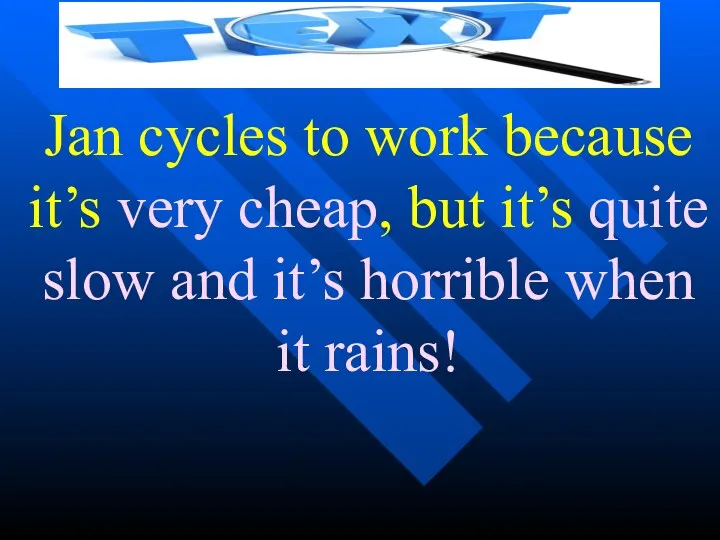
Jan cycles to work because it’s very cheap, but it’s quite
slow and it’s horrible when it rains!
Слайд 110
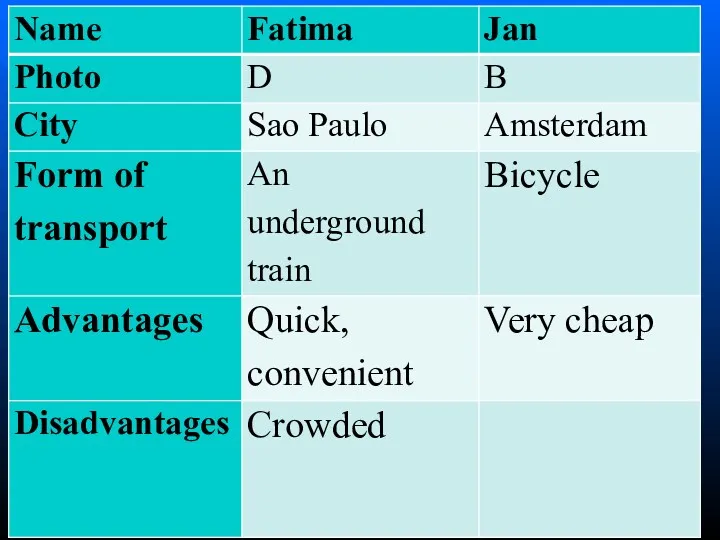
Слайд 111
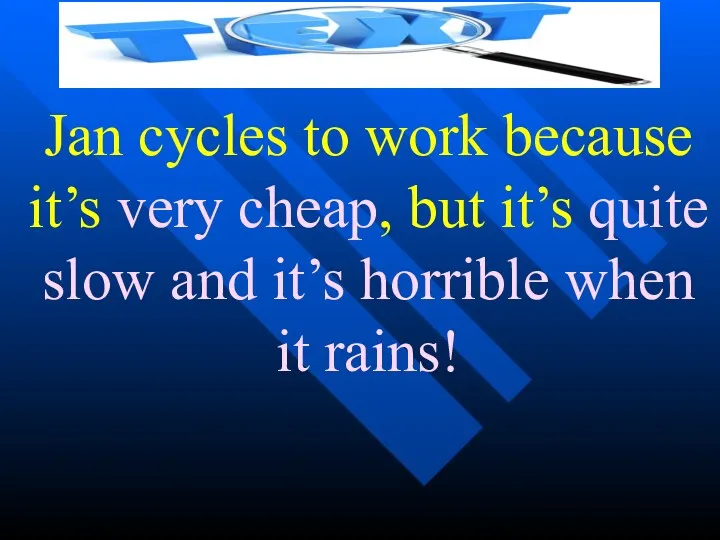
Jan cycles to work because it’s very cheap, but it’s quite
slow and it’s horrible when it rains!
Слайд 112
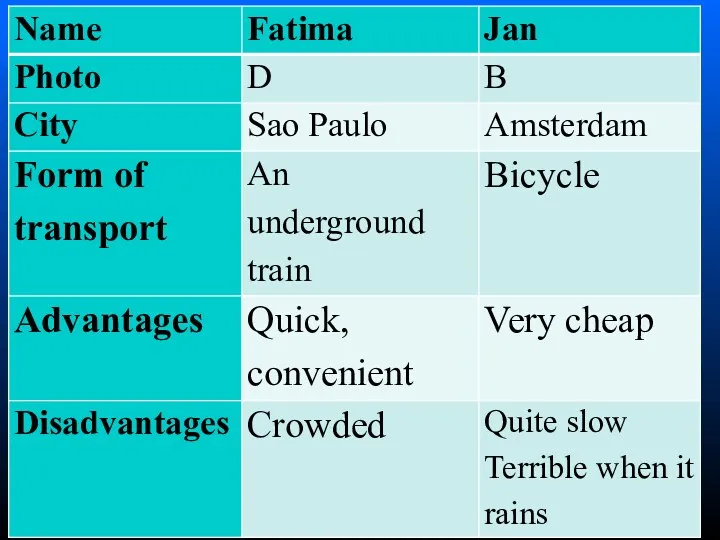
Слайд 113
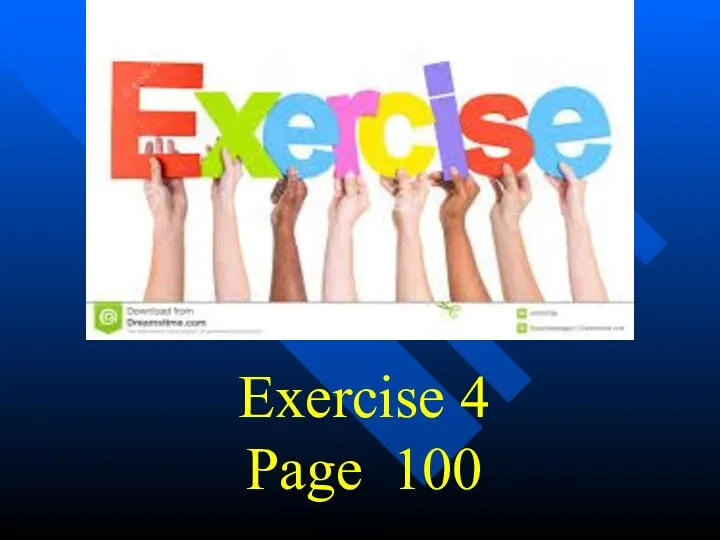
Слайд 114
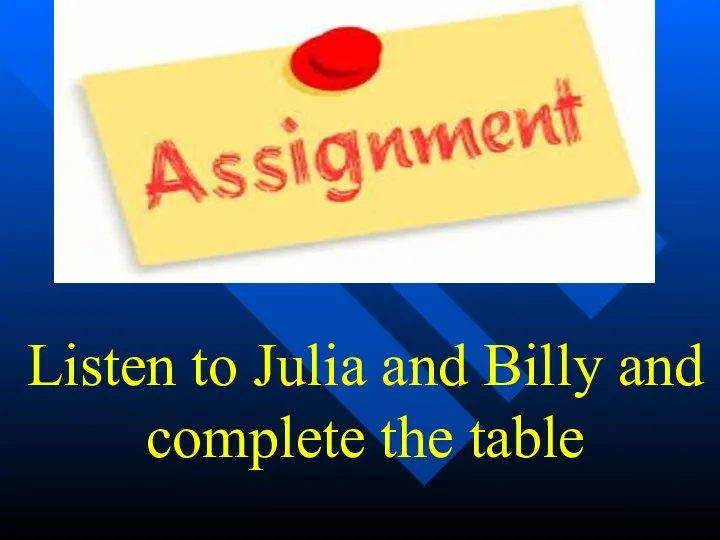
Listen to Julia and Billy and complete the table
Слайд 115
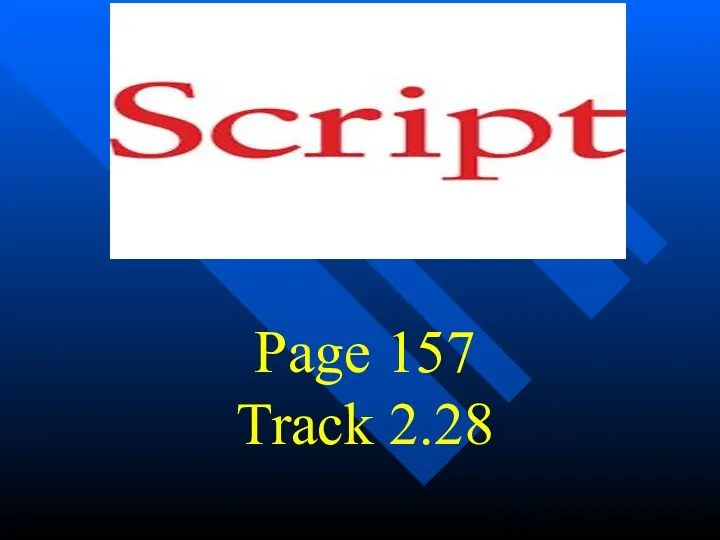
Слайд 116
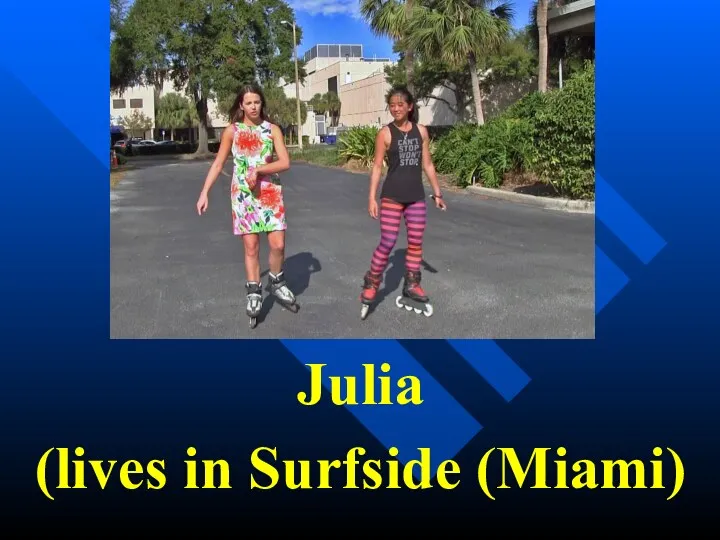
Julia
(lives in Surfside (Miami)
Слайд 117
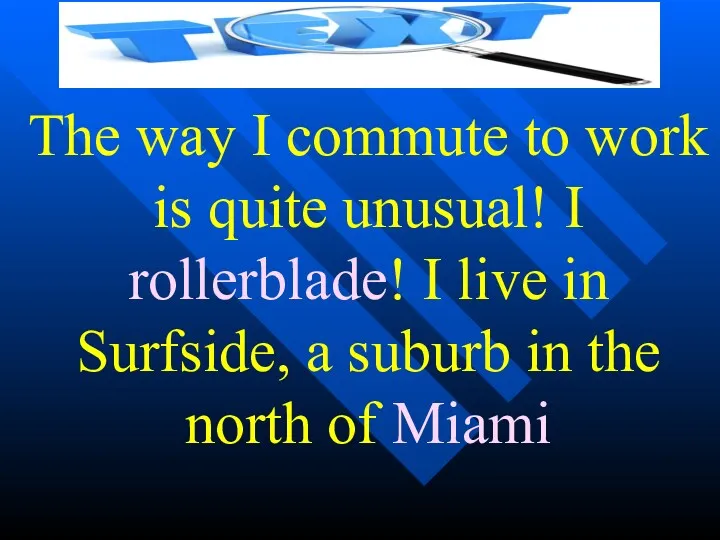
The way I commute to work is quite unusual! I rollerblade!
I live in Surfside, a suburb in the north of Miami
Слайд 118
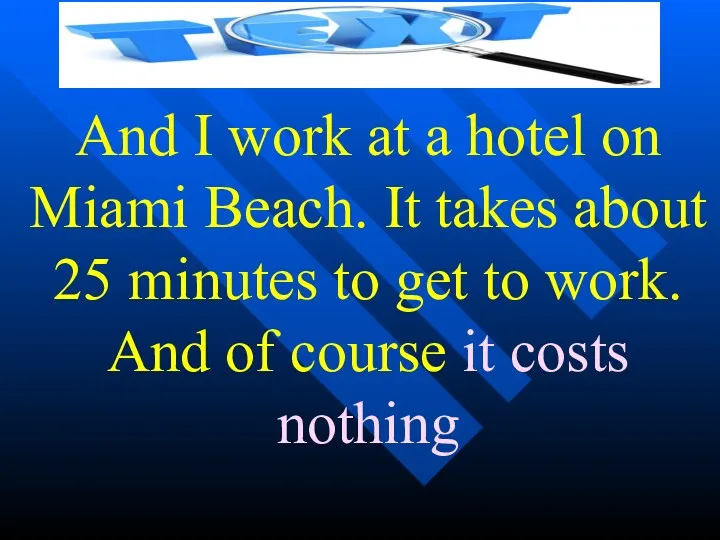
And I work at a hotel on Miami Beach. It takes
about 25 minutes to get to work. And of course it costs nothing
Слайд 119
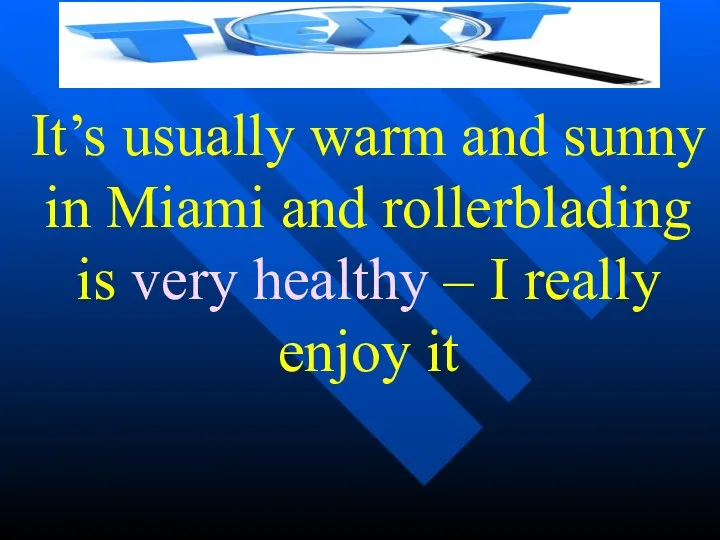
It’s usually warm and sunny in Miami and rollerblading is very
healthy – I really enjoy it
Слайд 120
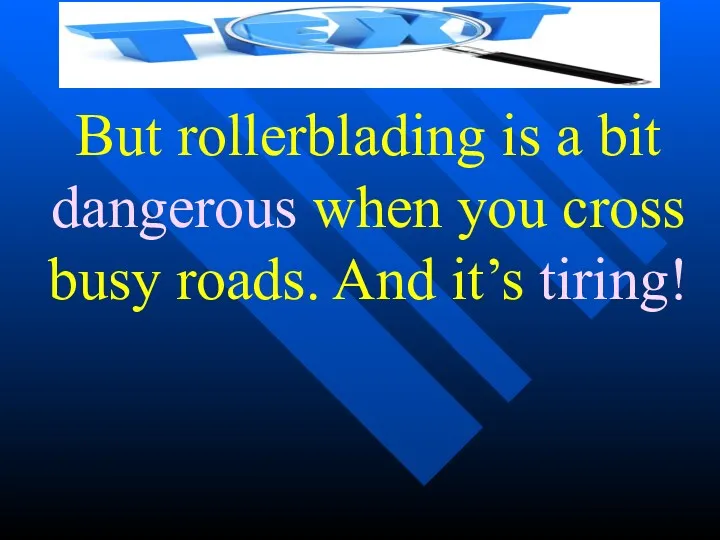
But rollerblading is a bit dangerous when you cross busy roads.
And it’s tiring!
Слайд 121
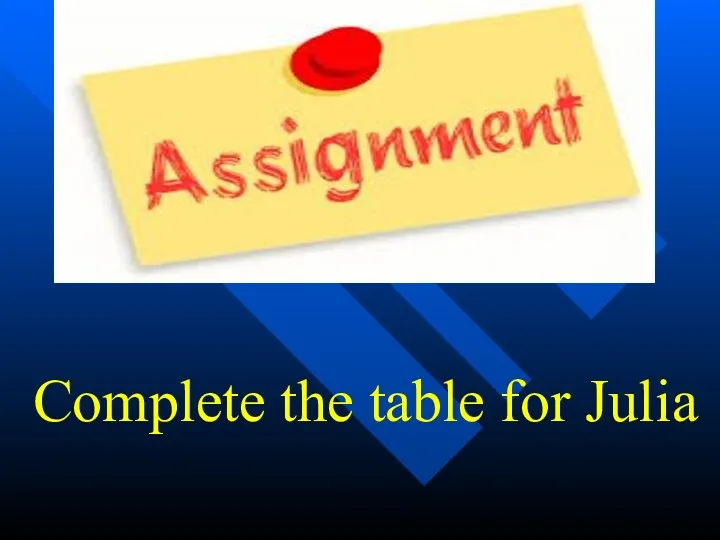
Complete the table for Julia
Слайд 122
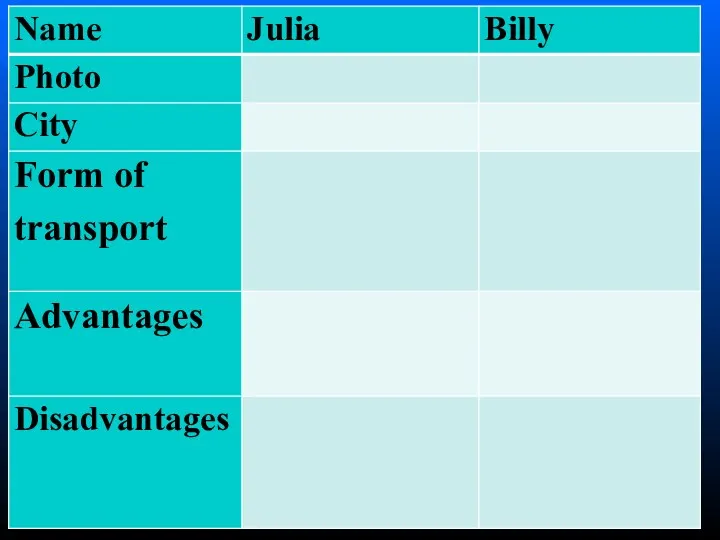
Слайд 123
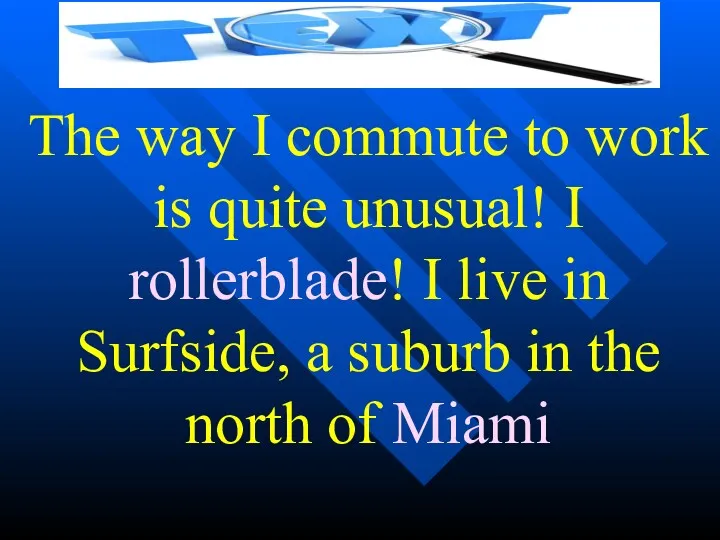
The way I commute to work is quite unusual! I rollerblade!
I live in Surfside, a suburb in the north of Miami
Слайд 124

Слайд 125
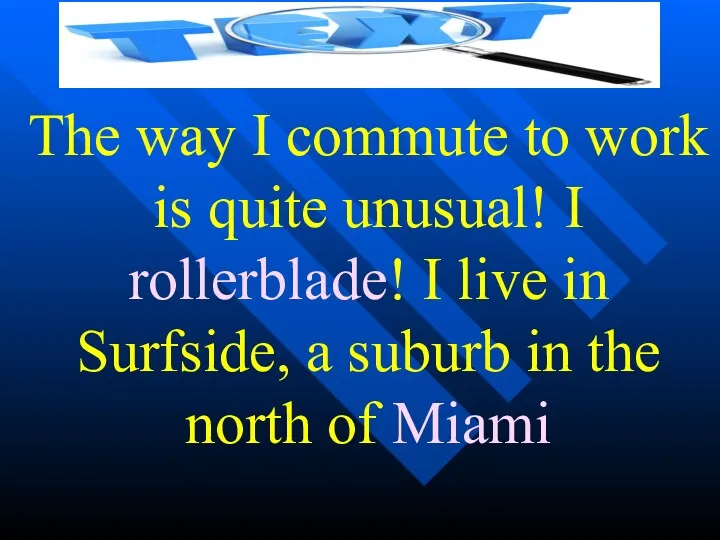
The way I commute to work is quite unusual! I rollerblade!
I live in Surfside, a suburb in the north of Miami
Слайд 126
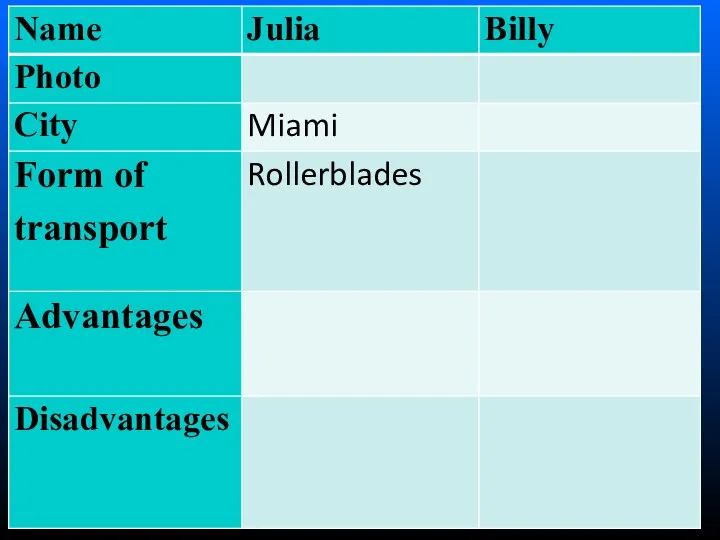
Слайд 127
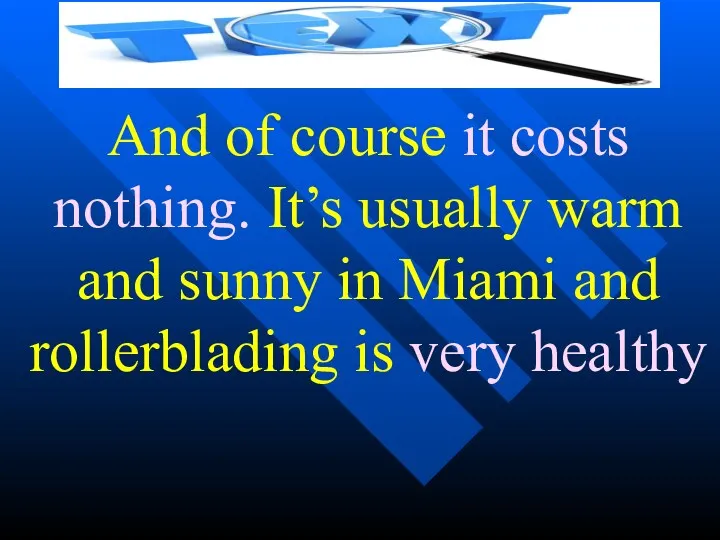
And of course it costs nothing. It’s usually warm and sunny
in Miami and rollerblading is very healthy
Слайд 128
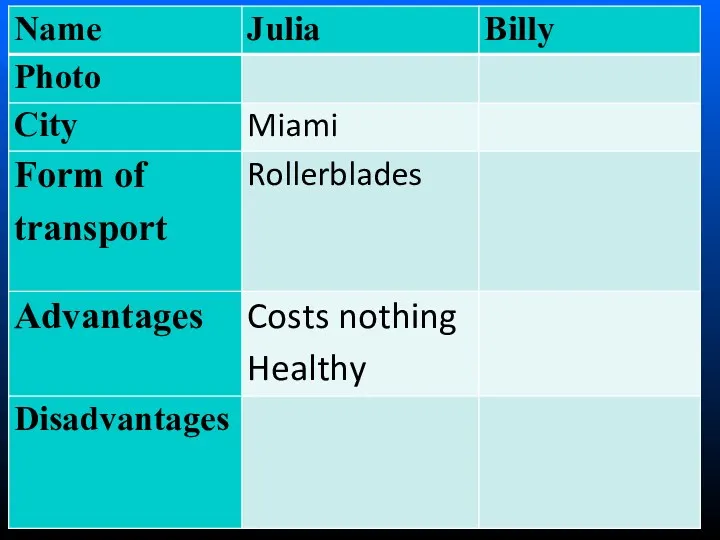
Слайд 129
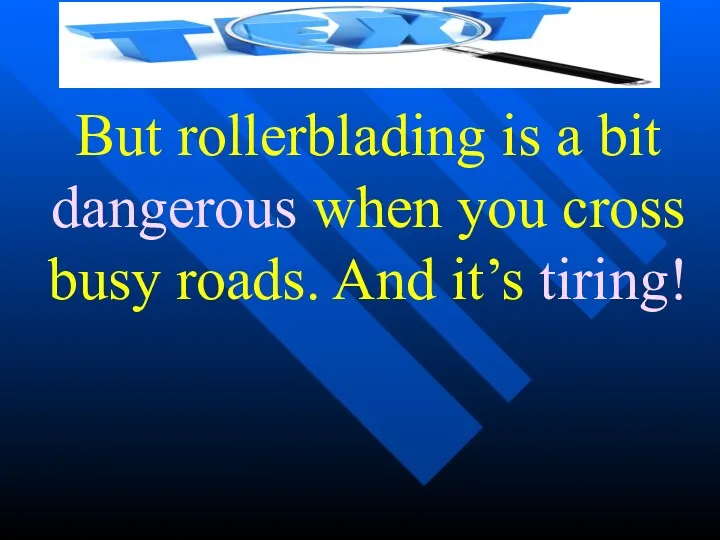
But rollerblading is a bit dangerous when you cross busy roads.
And it’s tiring!
Слайд 130

Слайд 131
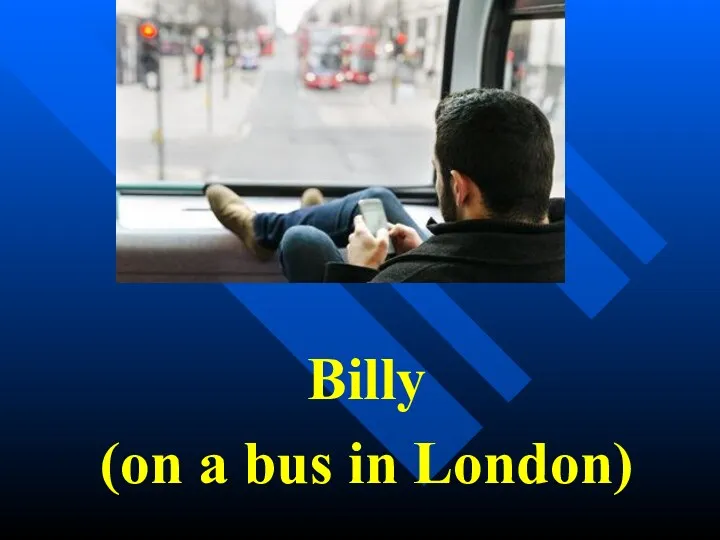
Billy
(on a bus in London)
Слайд 132
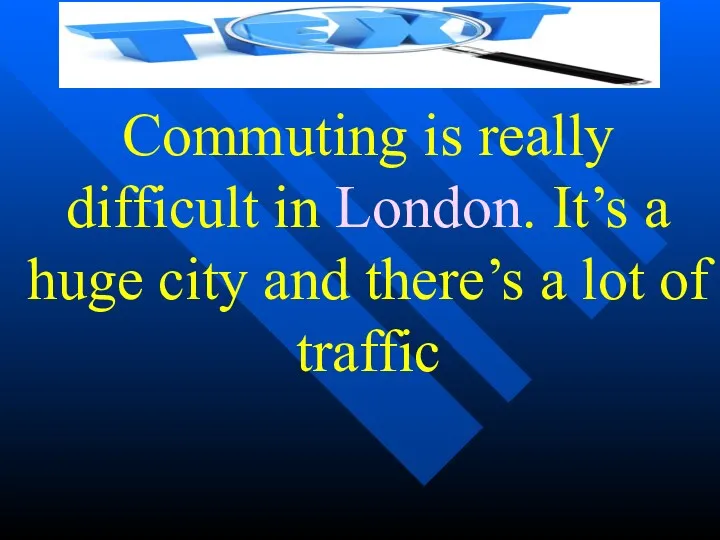
Commuting is really difficult in London. It’s a huge city and
there’s a lot of traffic
Слайд 133
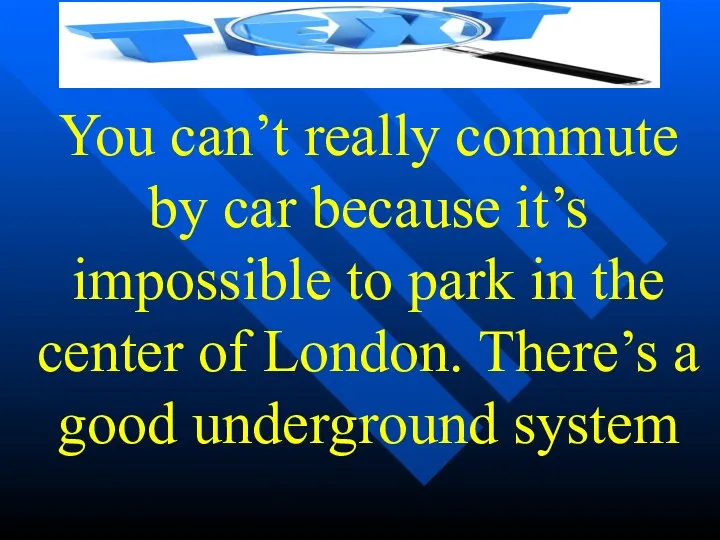
You can’t really commute by car because it’s impossible to park
in the center of London. There’s a good underground system
Слайд 134
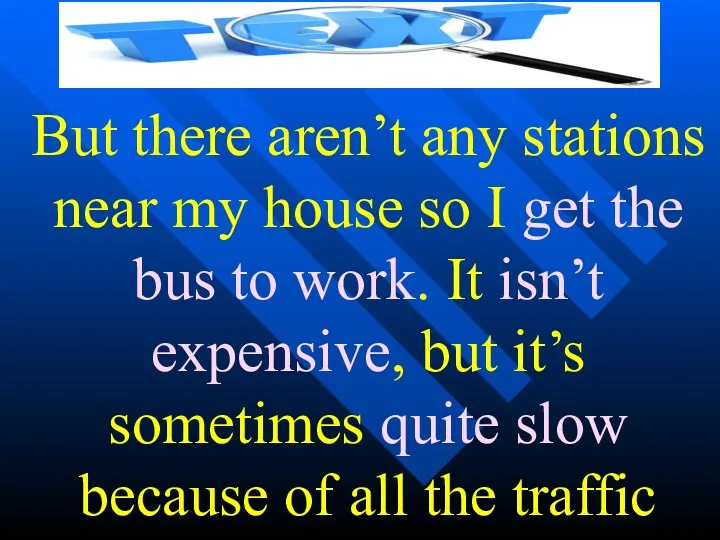
But there aren’t any stations near my house so I get
the bus to work. It isn’t expensive, but it’s sometimes quite slow because of all the traffic
Слайд 135
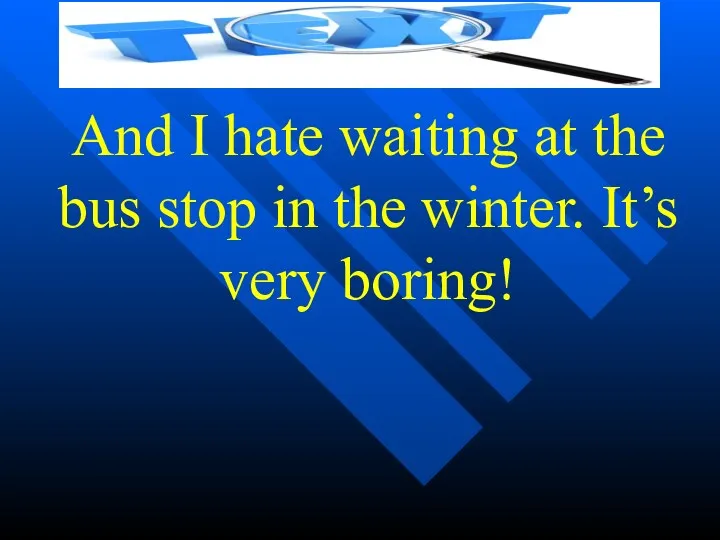
And I hate waiting at the bus stop in the winter.
It’s very boring!
Слайд 136
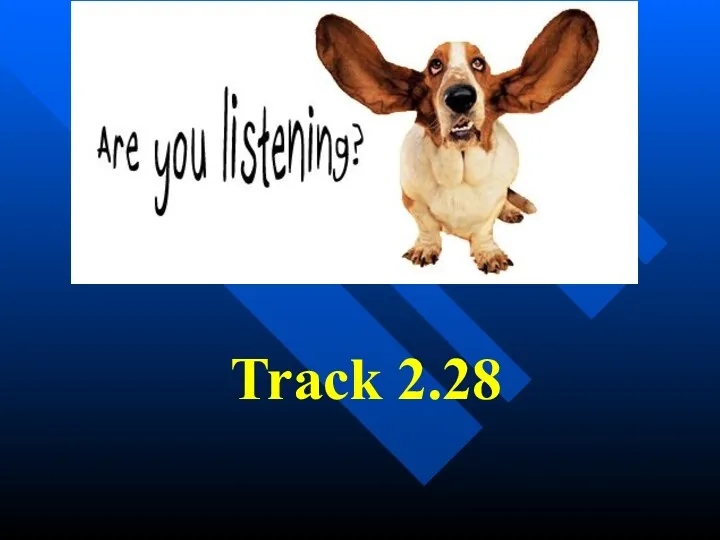
Слайд 137
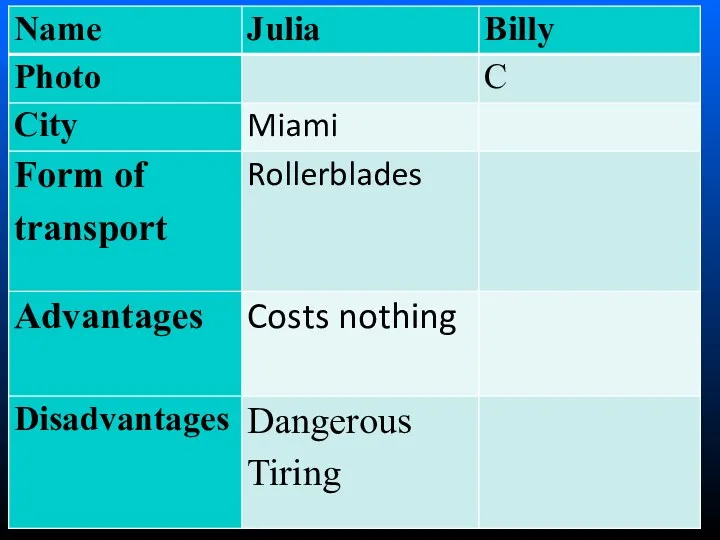
Слайд 138
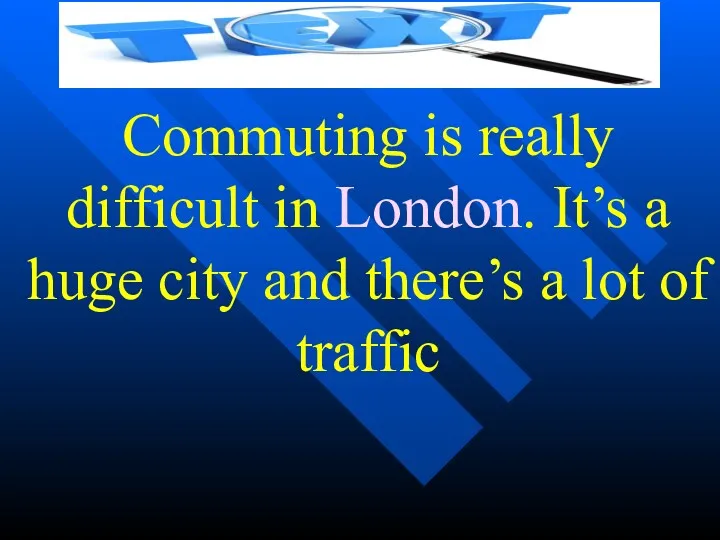
Commuting is really difficult in London. It’s a huge city and
there’s a lot of traffic
Слайд 139
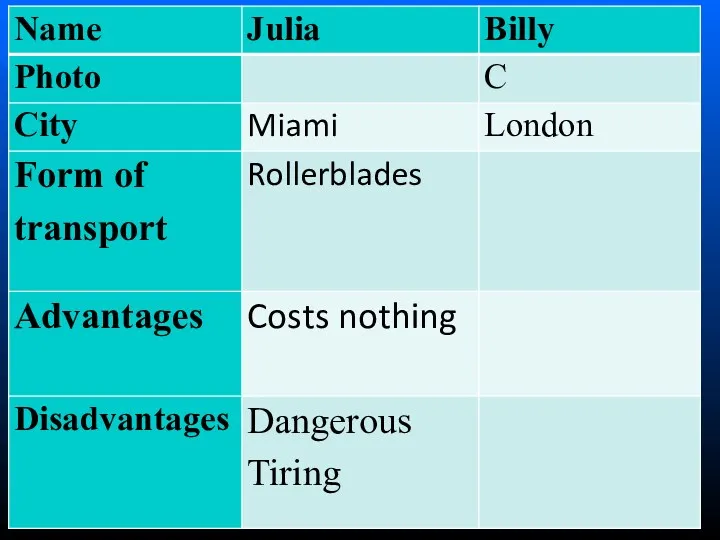
Слайд 140
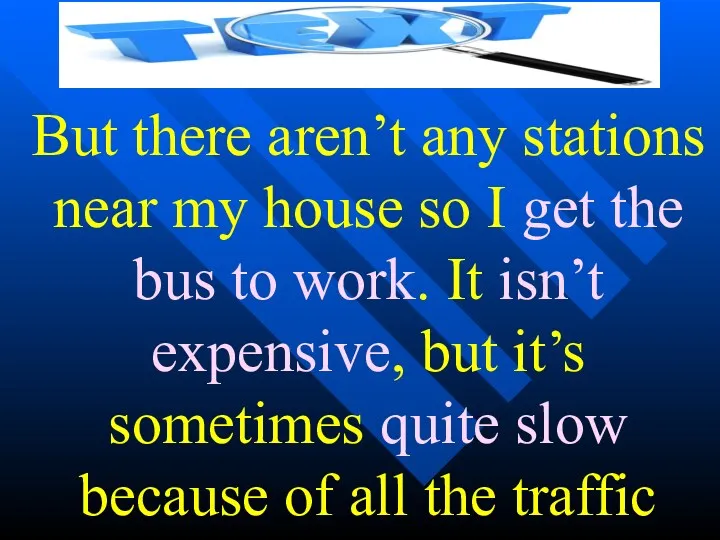
But there aren’t any stations near my house so I get
the bus to work. It isn’t expensive, but it’s sometimes quite slow because of all the traffic
Слайд 141
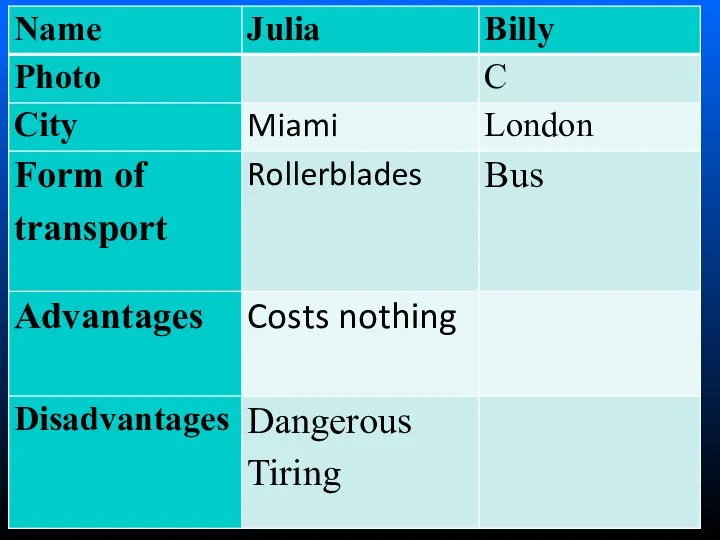
Слайд 142
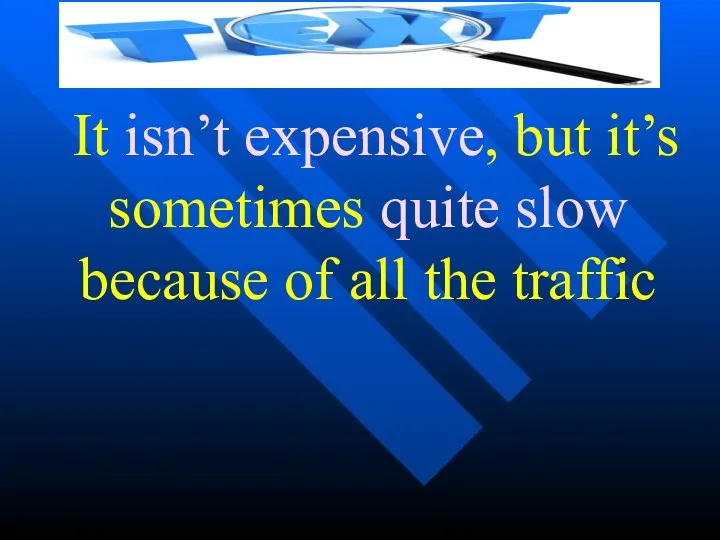
It isn’t expensive, but it’s sometimes quite slow because of
all the traffic
Слайд 143
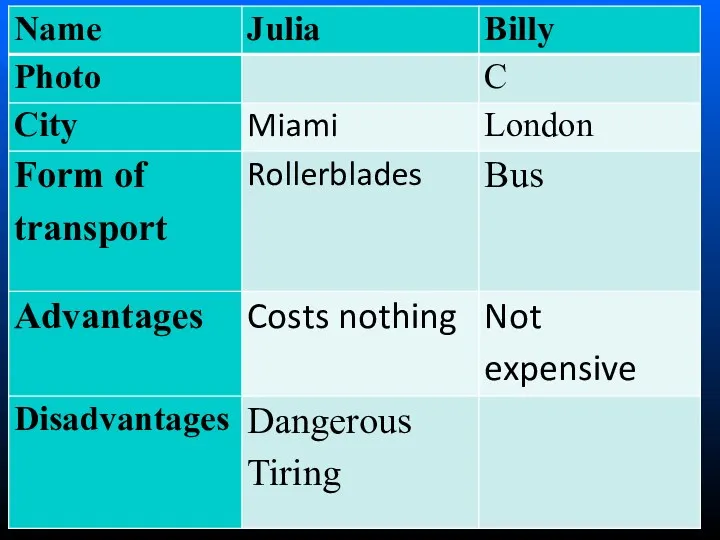
Слайд 144
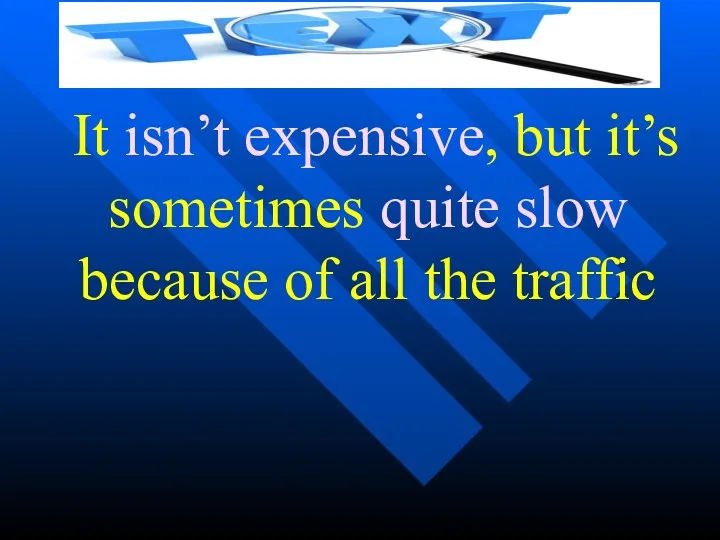
It isn’t expensive, but it’s sometimes quite slow because of
all the traffic
Слайд 145
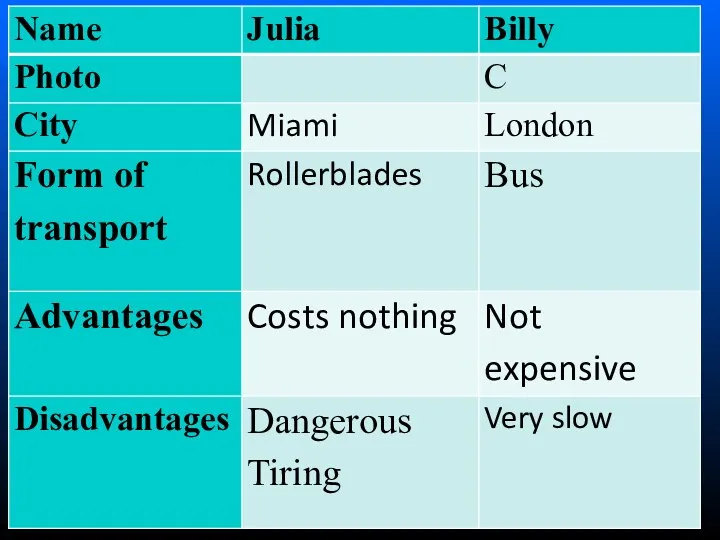
Слайд 146
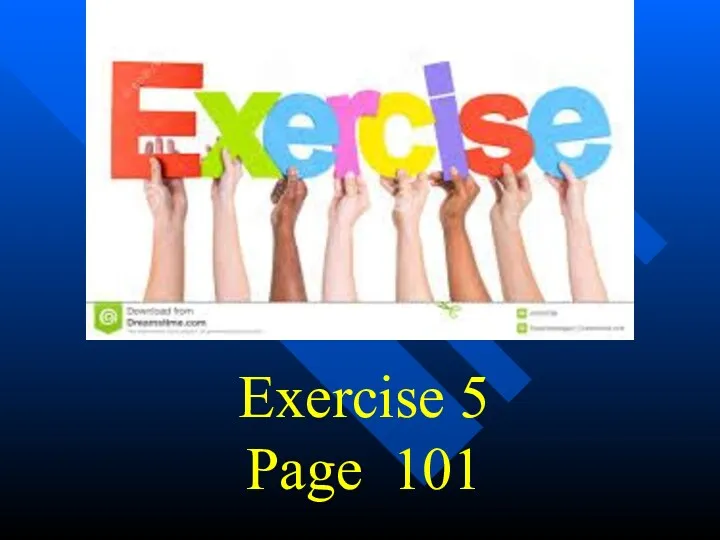
Слайд 147
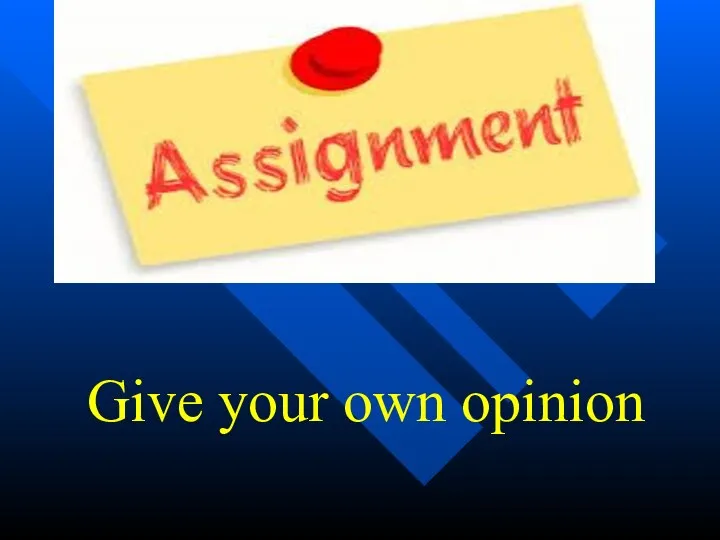
Слайд 148
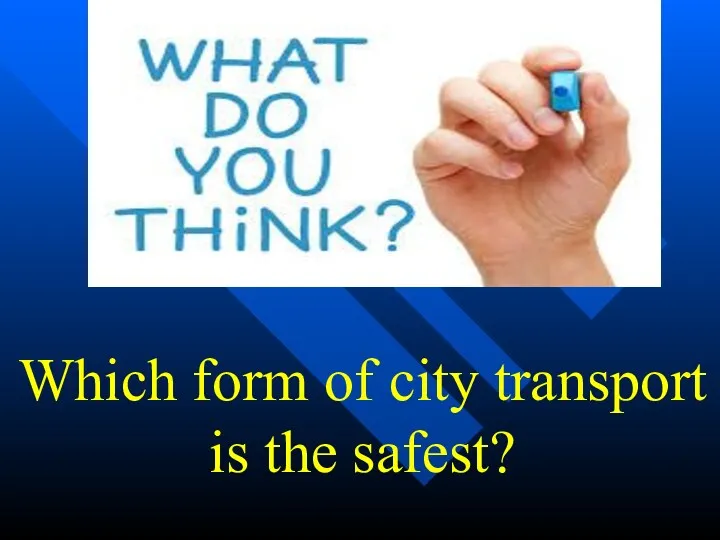
Which form of city transport is the safest?
Слайд 149
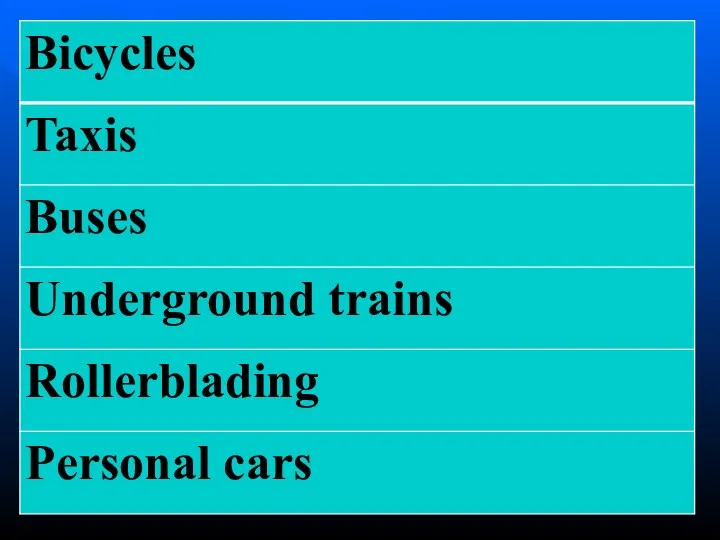
Слайд 150
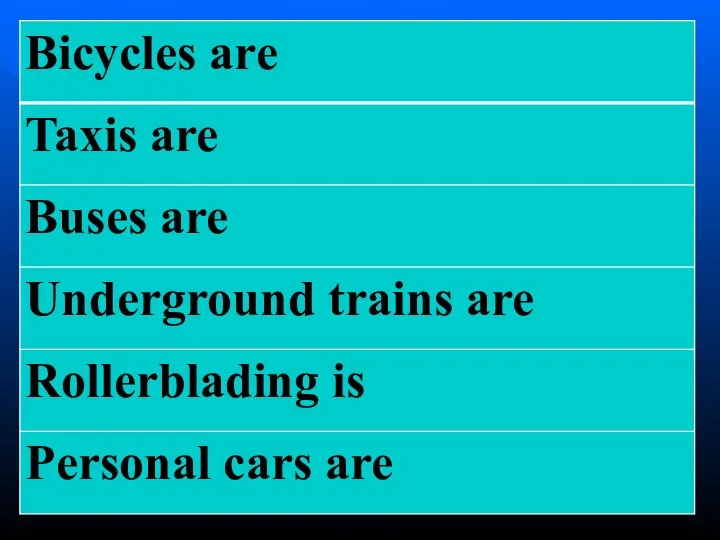
Слайд 151
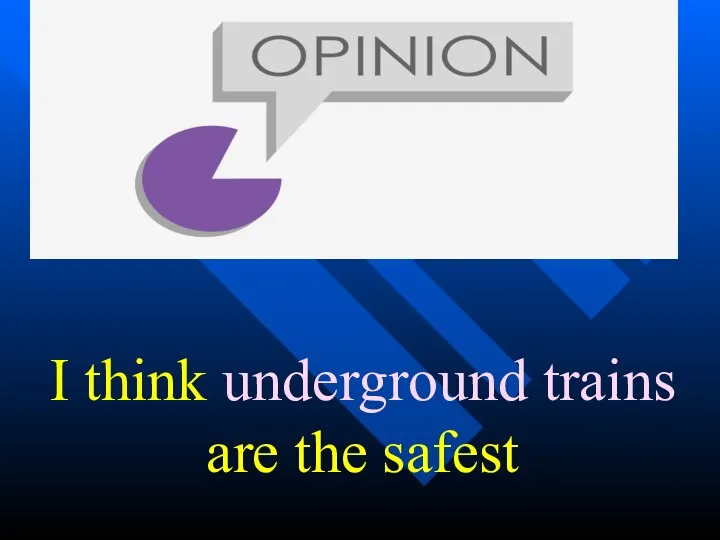
I think underground trains are the safest
Слайд 152
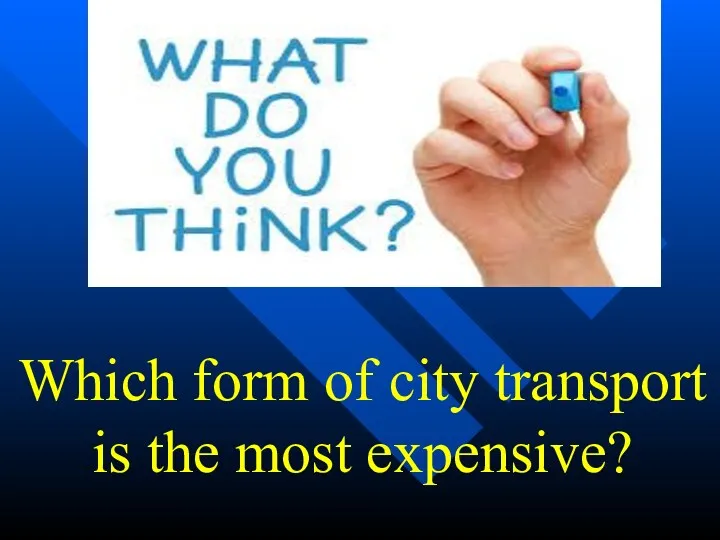
Which form of city transport is the most expensive?
Слайд 153
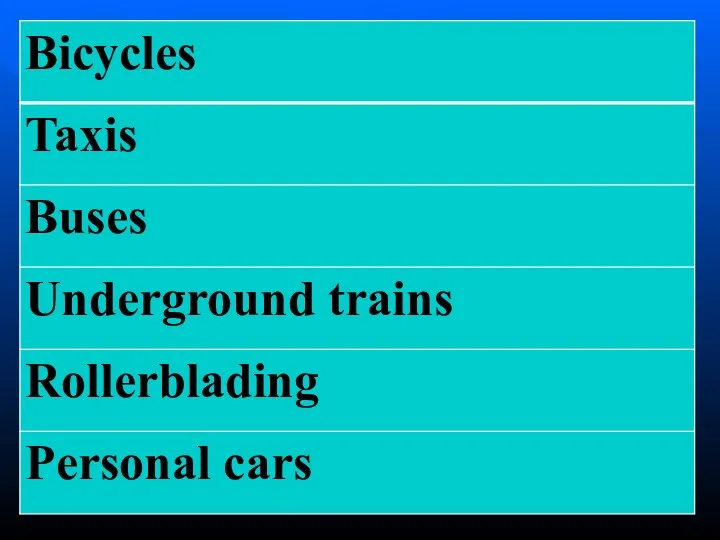
Слайд 154
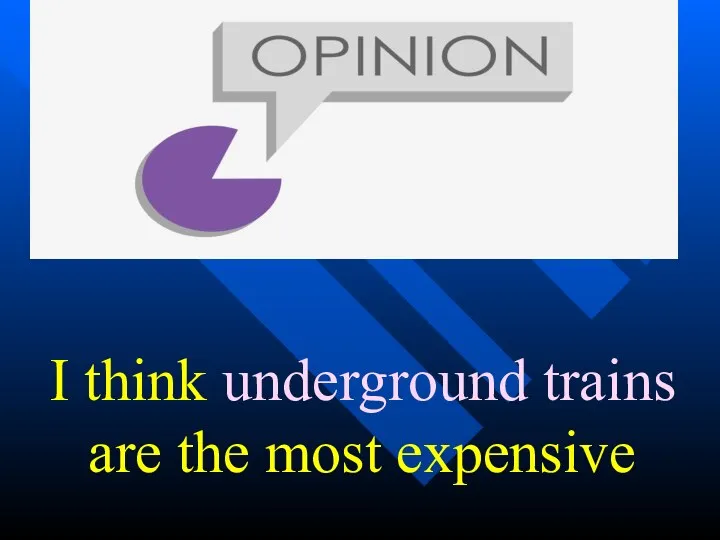
I think underground trains are the most expensive
Слайд 155
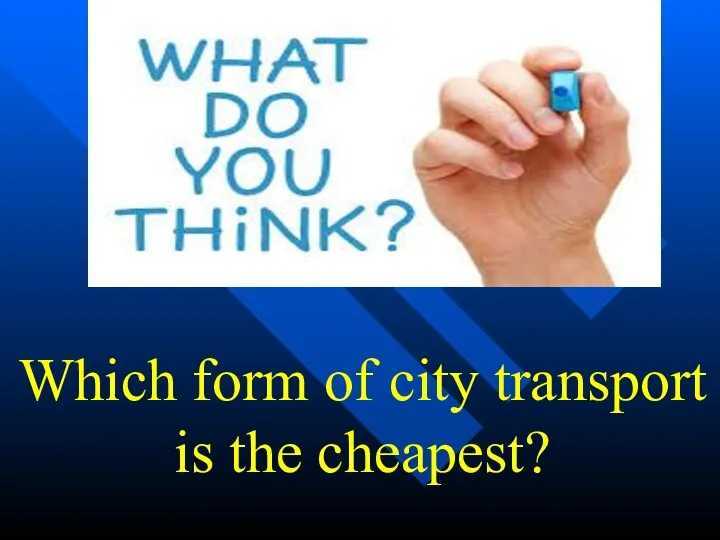
Which form of city transport is the cheapest?
Слайд 156
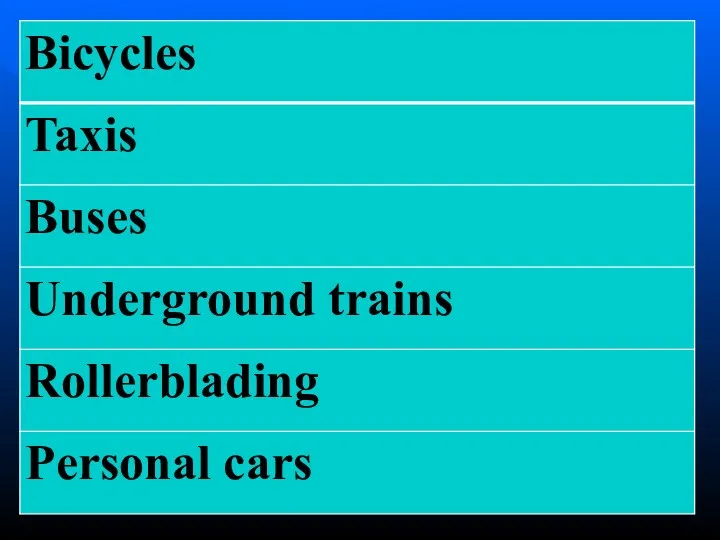
Слайд 157

I believe rollerblading is the cheapest
Слайд 158
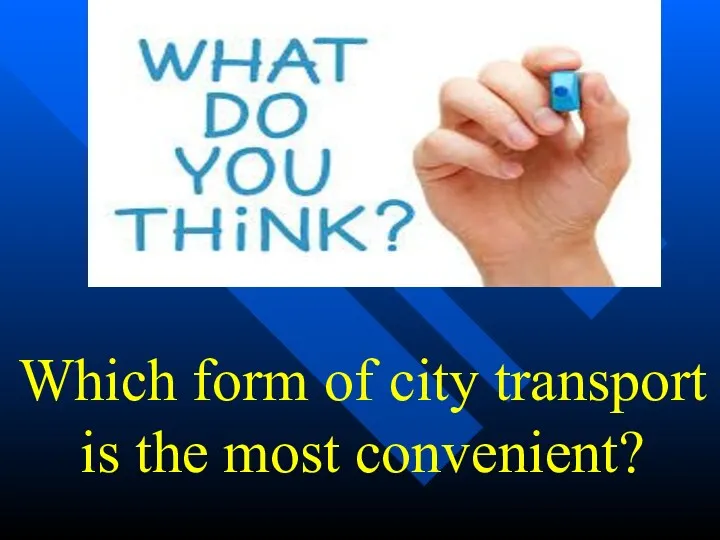
Which form of city transport is the most convenient?
Слайд 159
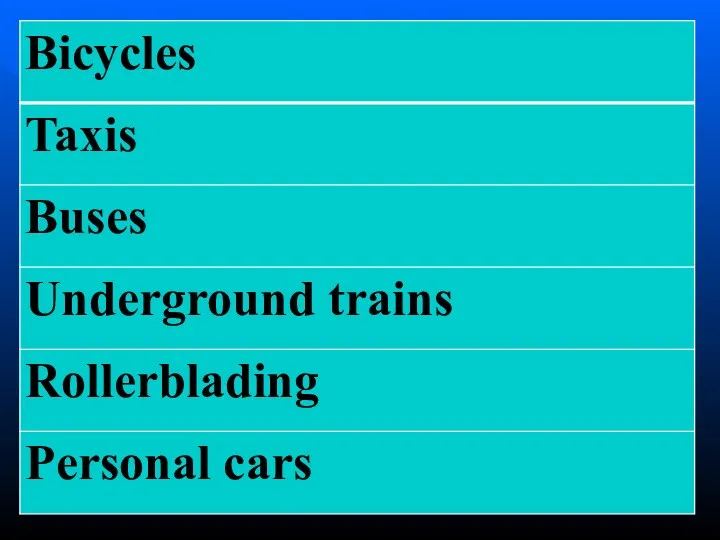
Слайд 160

I think underground trains are the most convenient
Слайд 161
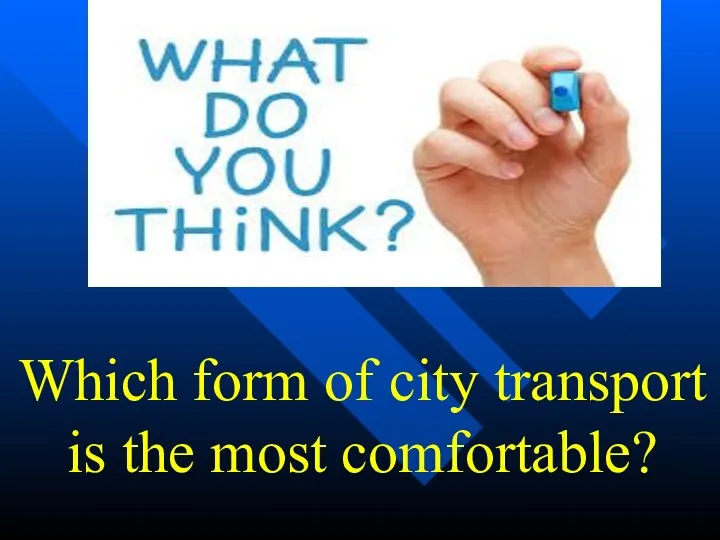
Which form of city transport is the most comfortable?
Слайд 162
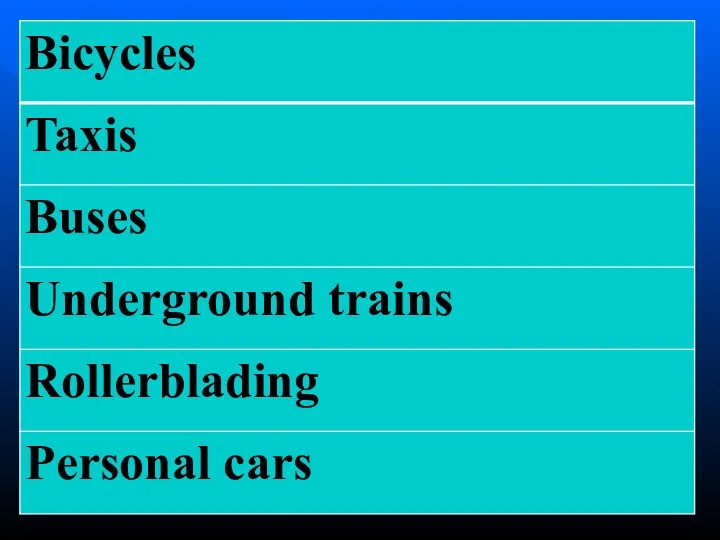
Слайд 163
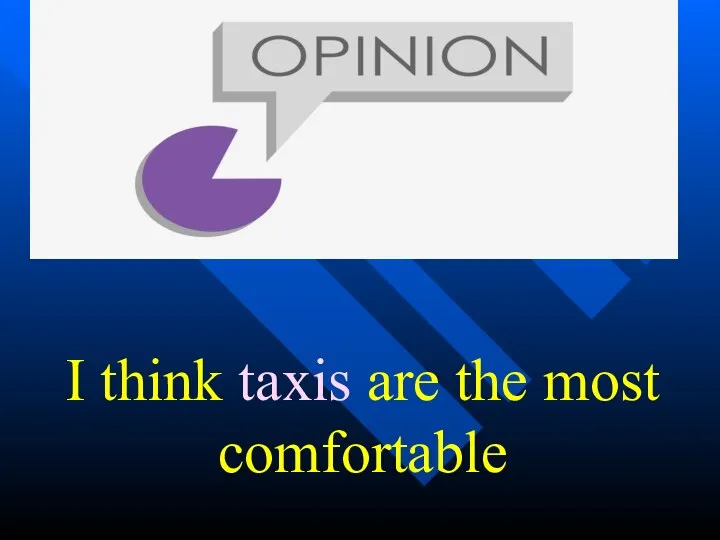
I think taxis are the most comfortable
Слайд 164
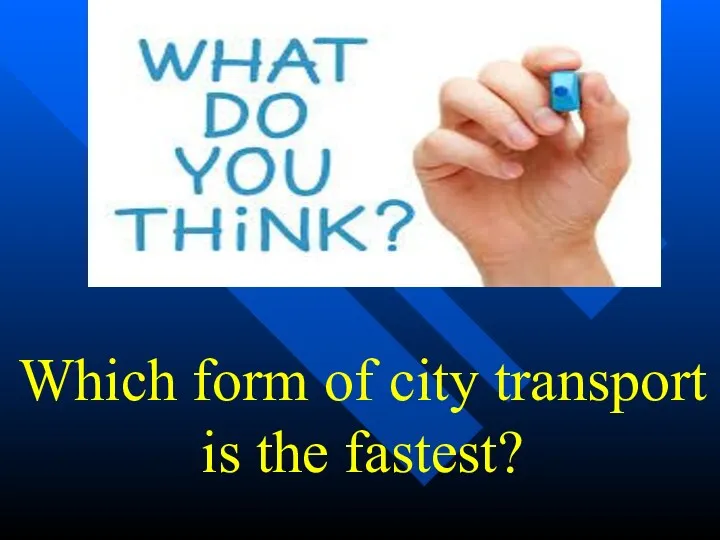
Which form of city transport is the fastest?
Слайд 165
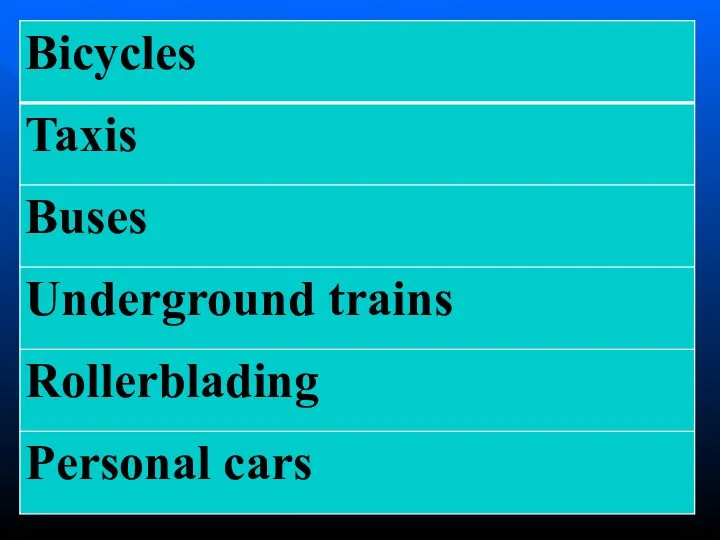
Слайд 166
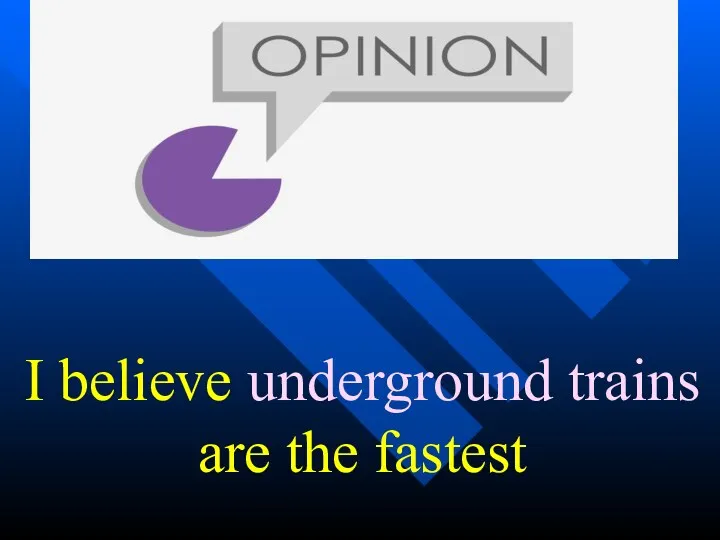
I believe underground trains are the fastest
Слайд 167
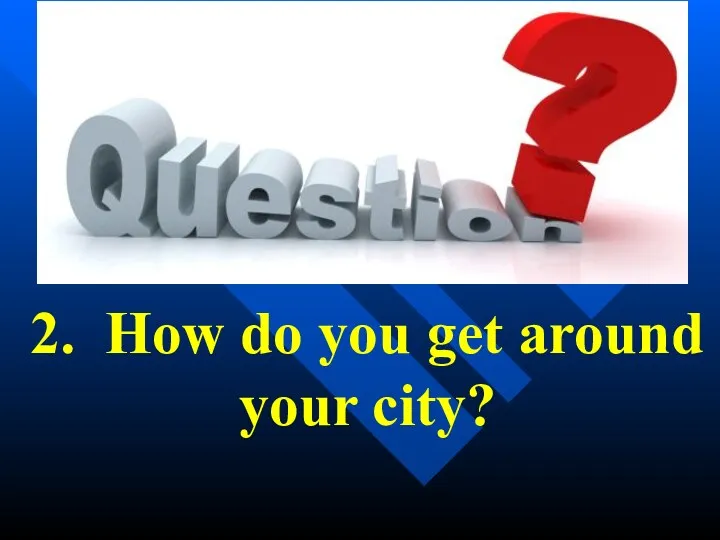
2. How do you get around your city?
Слайд 168
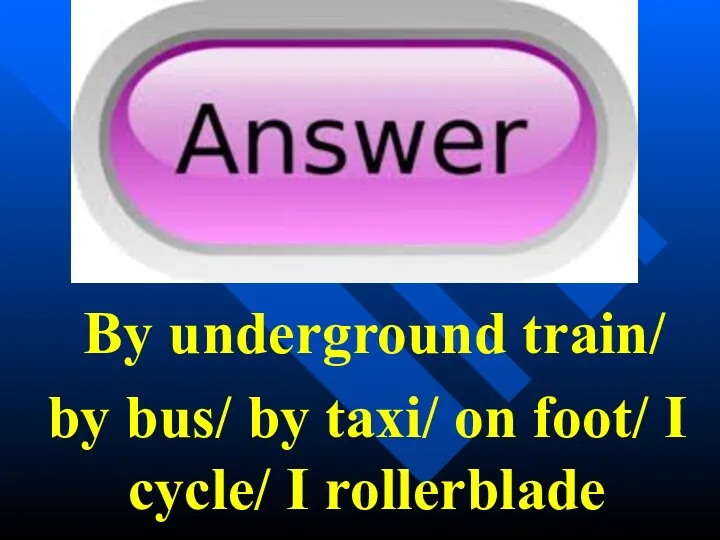
By underground train/
by bus/ by taxi/ on foot/ I cycle/
I rollerblade
Слайд 169

3. Which form of commuting do you think is the best?
Why?
Слайд 170
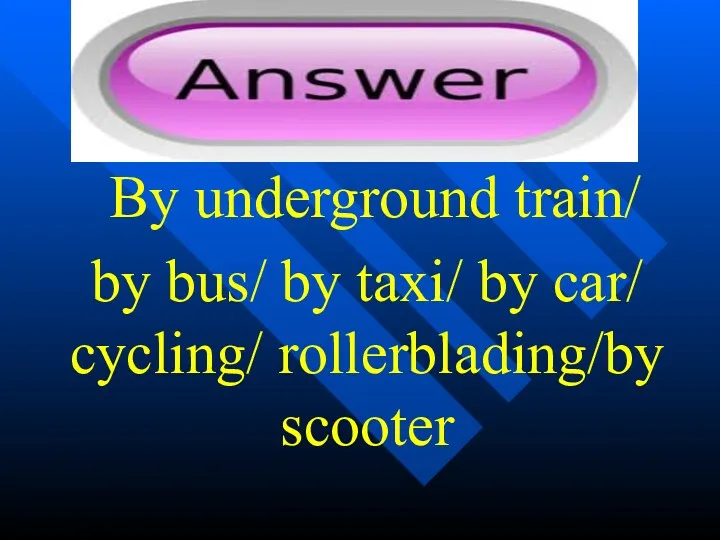
By underground train/
by bus/ by taxi/ by car/ cycling/ rollerblading/by
scooter
Слайд 171
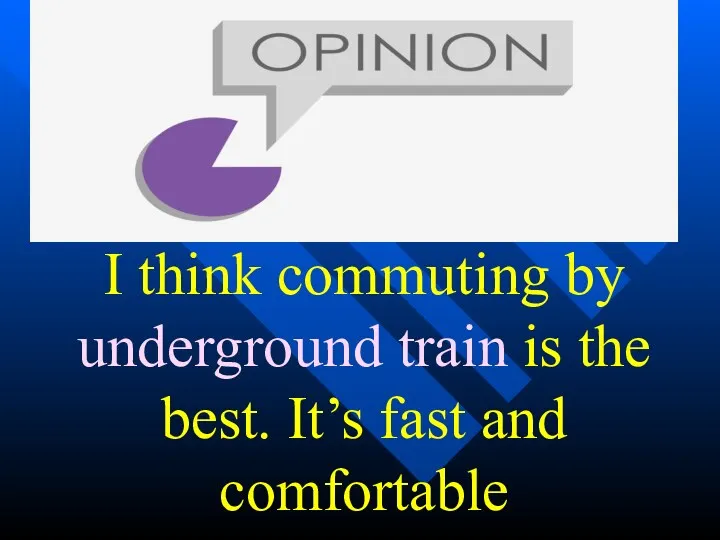
I think commuting by underground train is the
best. It’s fast and
comfortable
Слайд 172
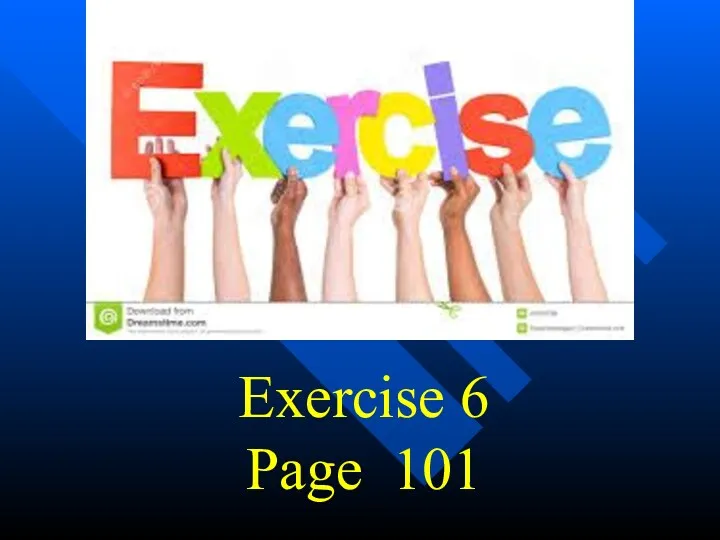
Слайд 173
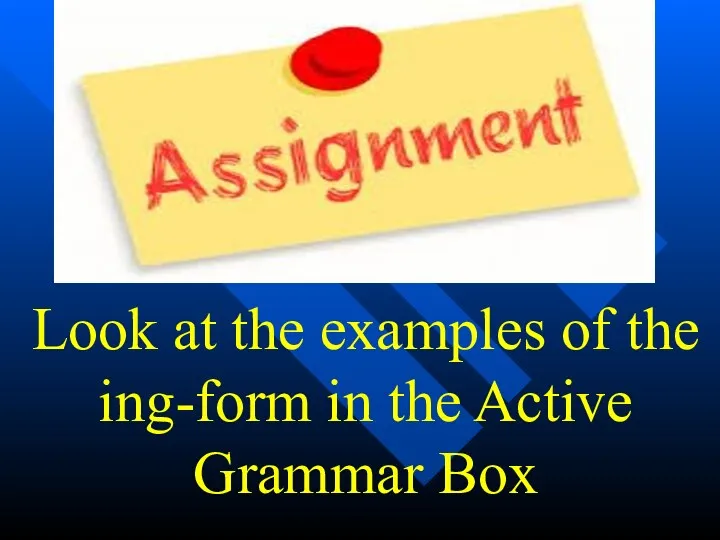
Look at the examples of the ing-form in the Active Grammar
Box
Слайд 174

Ing-form is singular and is used with is
Слайд 175

Rollerblading is a bit difficult when you cross busy roads
Слайд 176
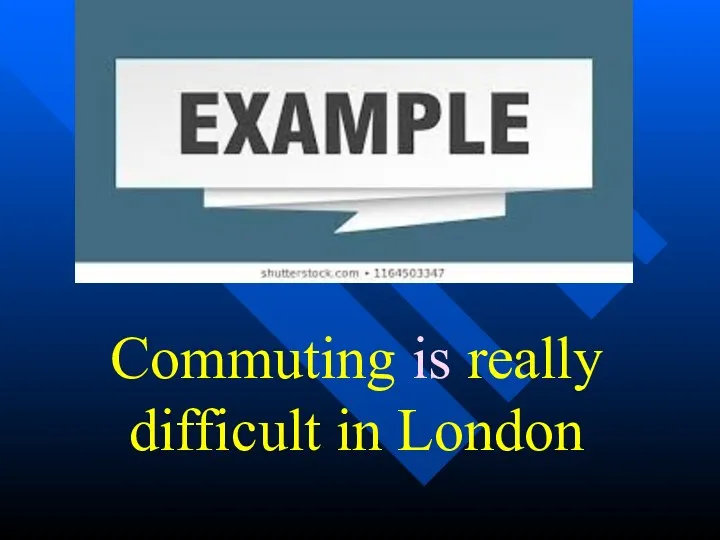
Commuting is really difficult in London
Слайд 177

Swimming is my favorite sport
Слайд 178
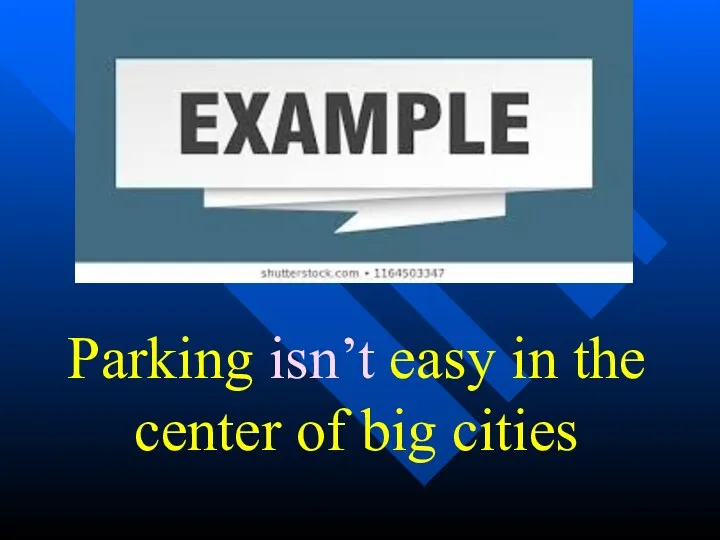
Parking isn’t easy in the center of big cities
Слайд 179
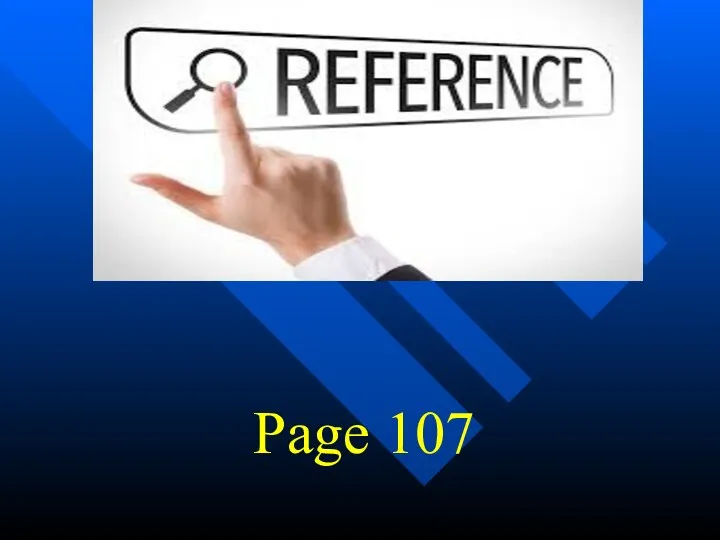
Слайд 180
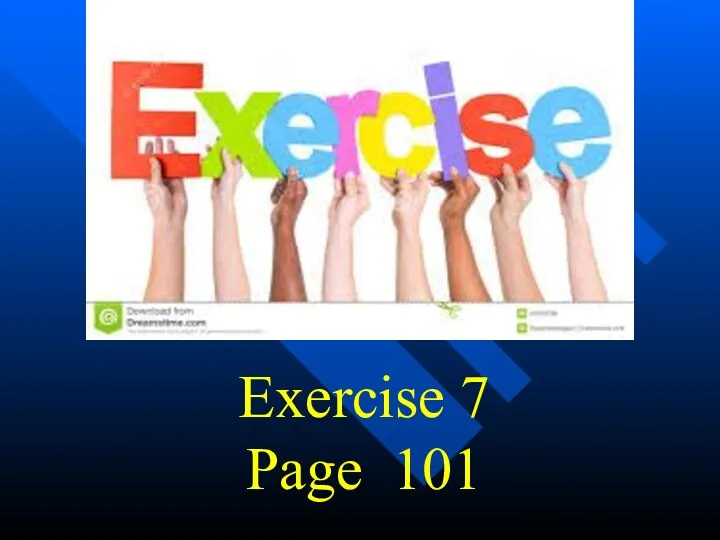
Слайд 181
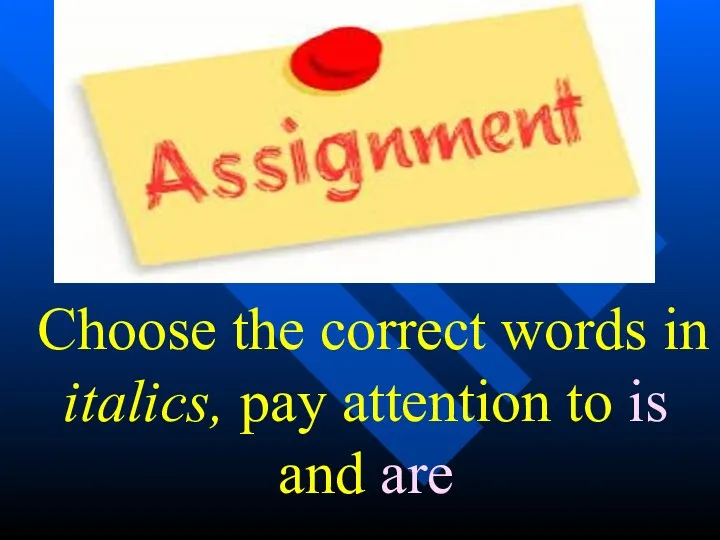
Choose the correct words in italics, pay attention to is
and are
Слайд 182
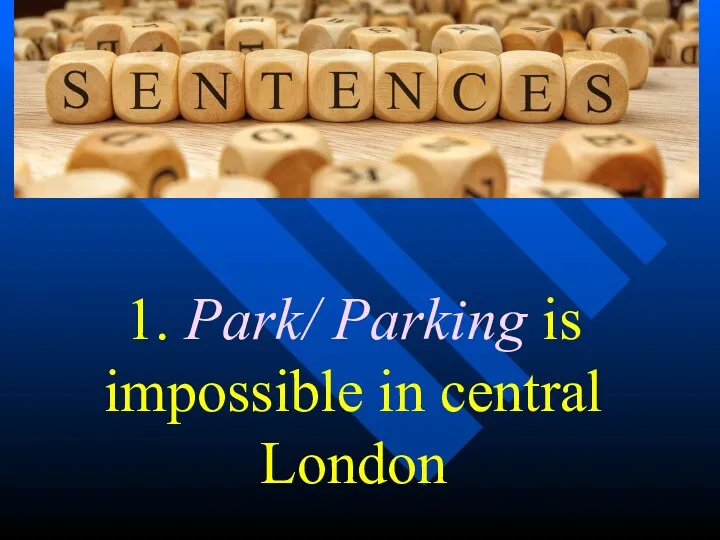
1. Park/ Parking is impossible in central London
Слайд 183
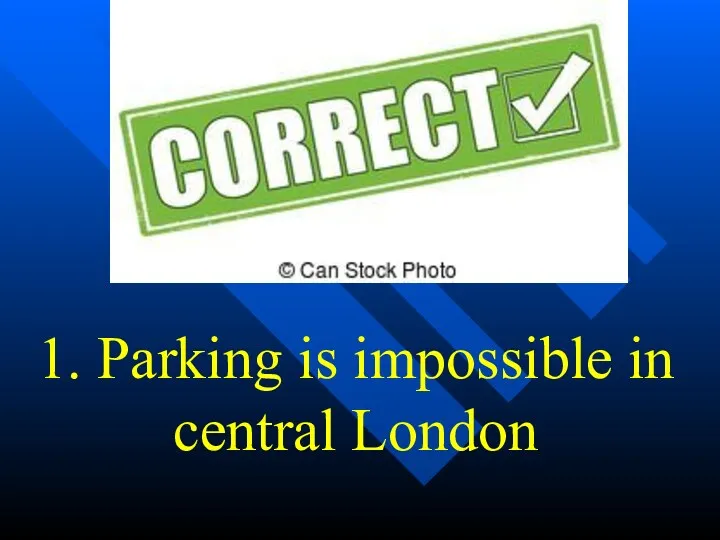
1. Parking is impossible in central London
Слайд 184
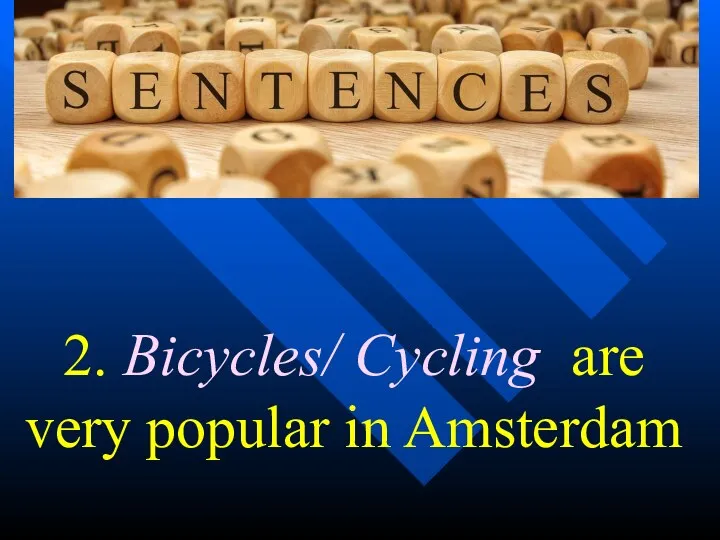
2. Bicycles/ Cycling are very popular in Amsterdam
Слайд 185
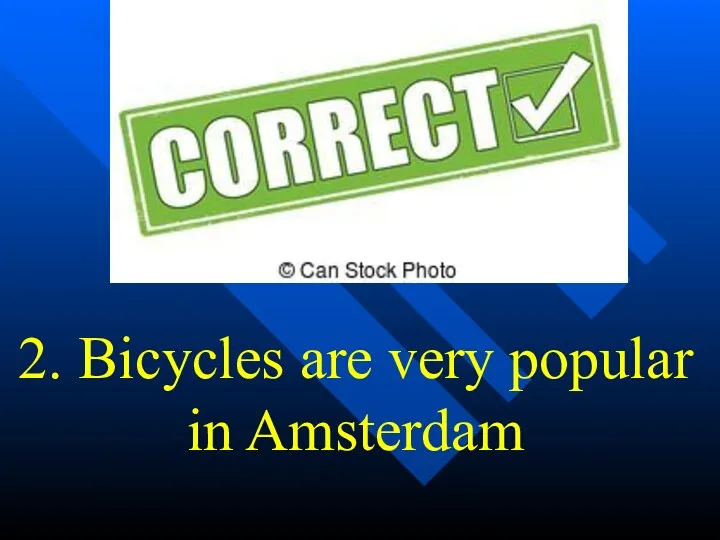
2. Bicycles are very popular in Amsterdam
Слайд 186
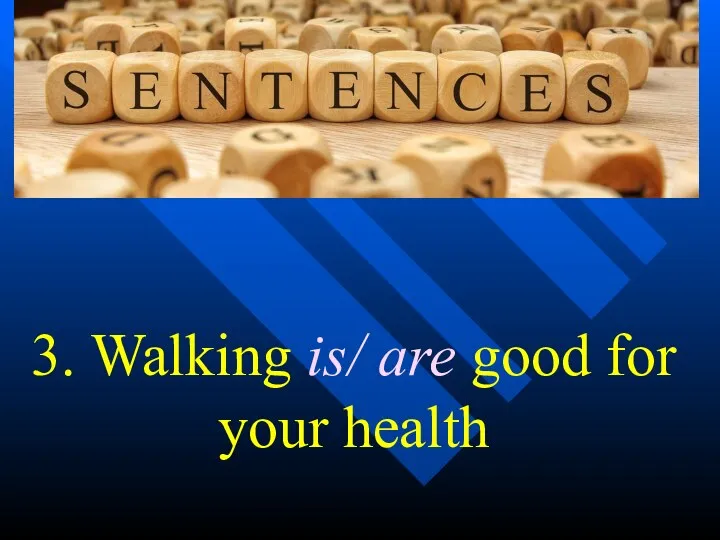
3. Walking is/ are good for your health
Слайд 187

3. Walking is good for your health
Слайд 188
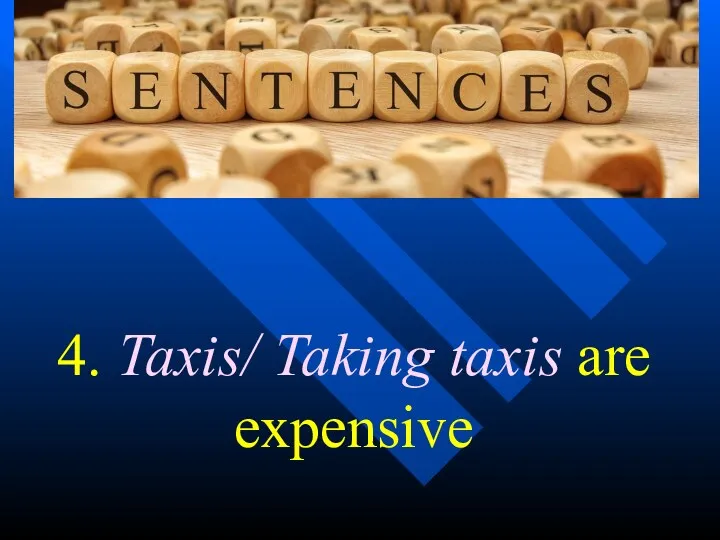
4. Taxis/ Taking taxis are expensive
Слайд 189
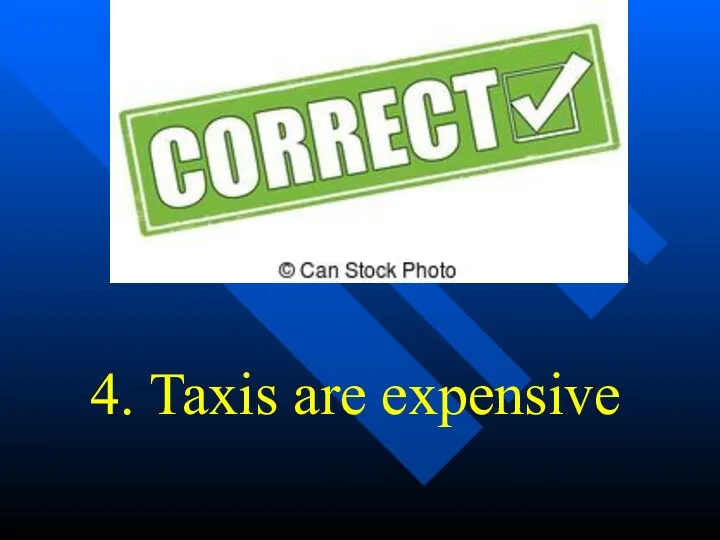
Слайд 190
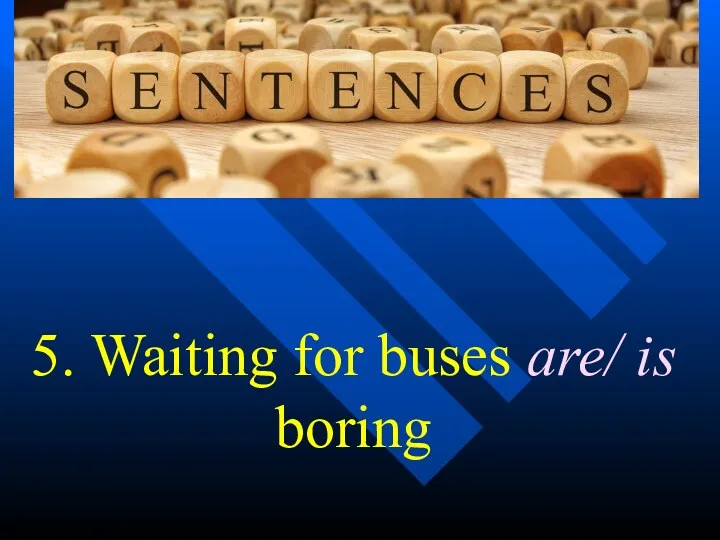
5. Waiting for buses are/ is boring
Слайд 191

5. Waiting for buses is boring
Слайд 192
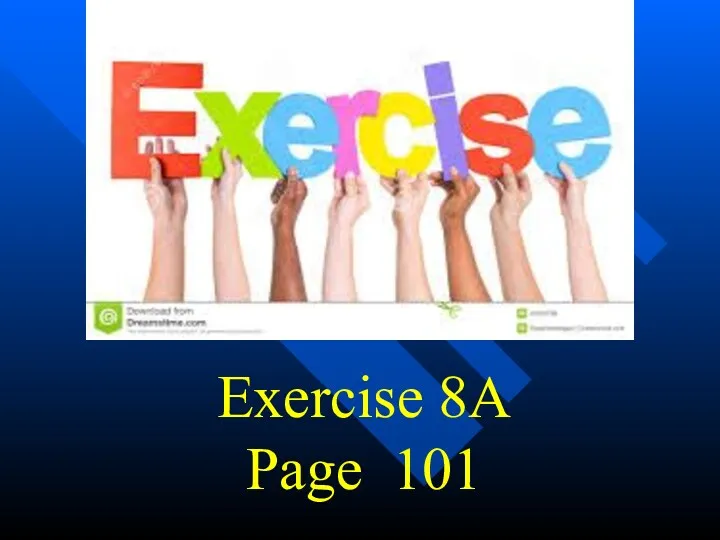
Слайд 193

Brendan wants to take his friends for a short break. Listen
and answer the questions
Слайд 194
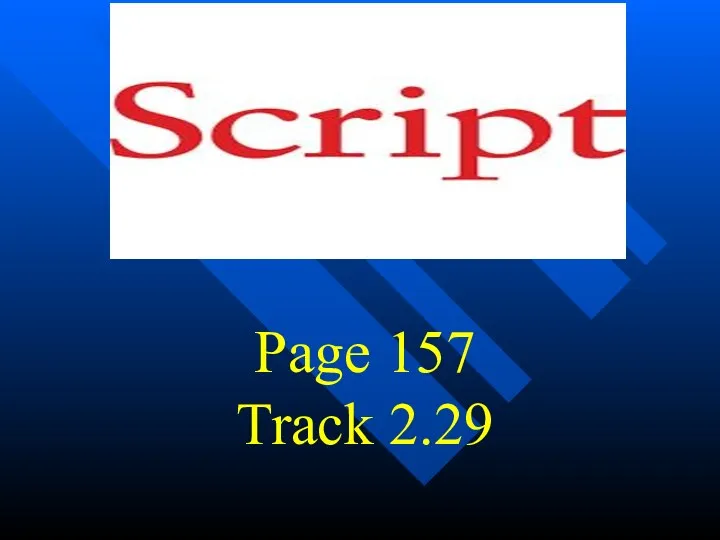
Слайд 195

Слайд 196
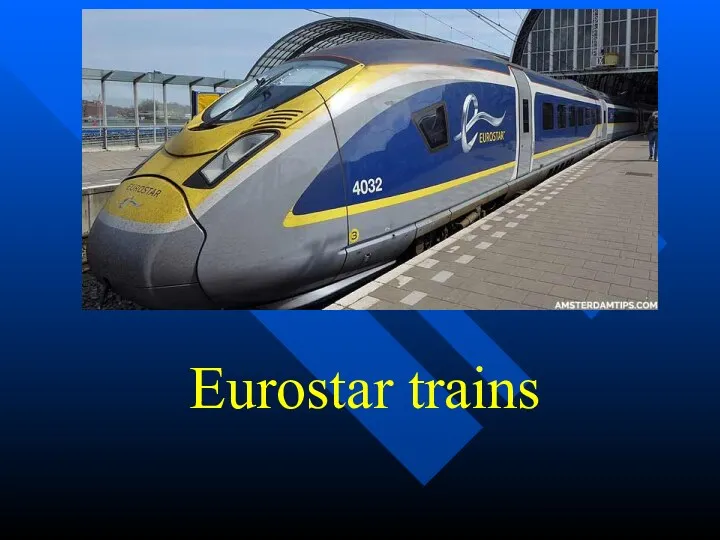
Слайд 197
![Destination [desti’neʃən] – пункт назначения](/_ipx/f_webp&q_80&fit_contain&s_1440x1080/imagesDir/jpg/581422/slide-196.jpg)
Destination [desti’neʃən] – пункт назначения
Слайд 198
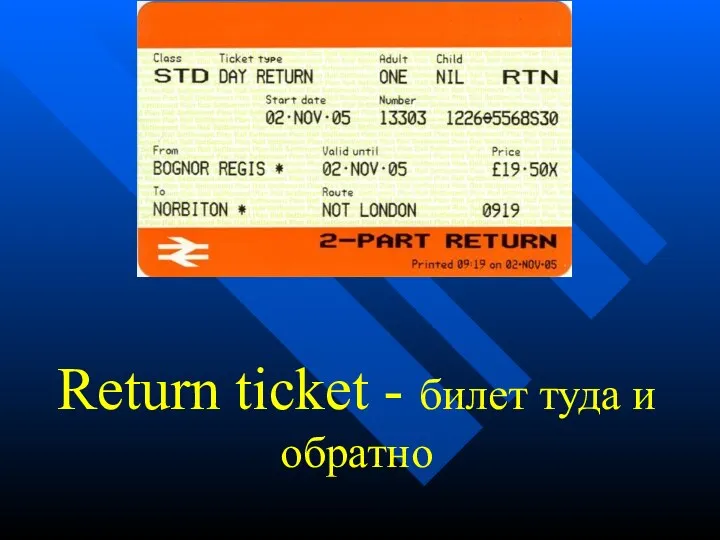
Return ticket - билет туда и обратно
Слайд 199
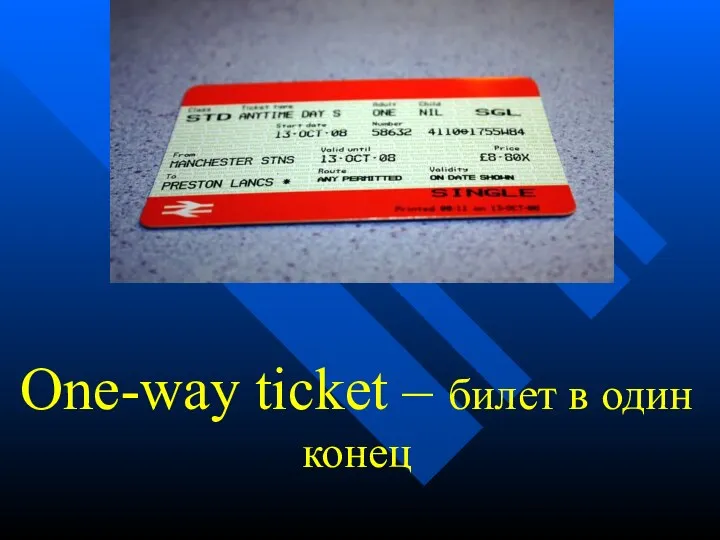
One-way ticket – билет в один конец
Слайд 200
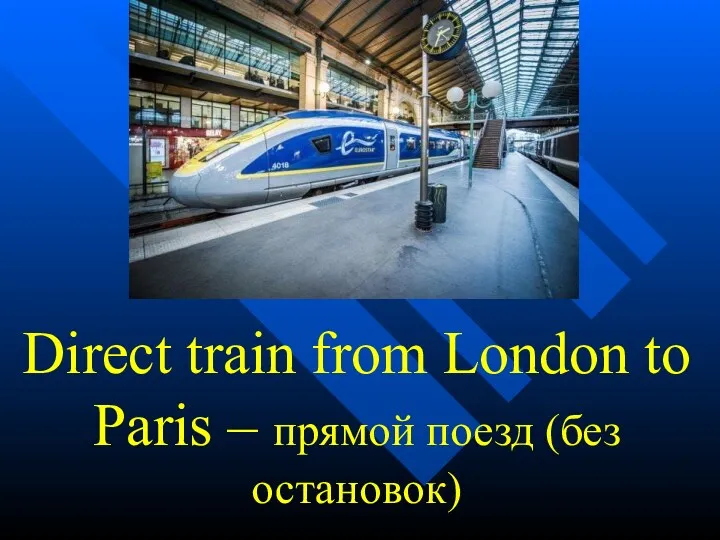
Direct train from London to Paris – прямой поезд (без остановок)
Слайд 201

Read script 2.29 on page 157
Слайд 202

B – Brendan
T – travel agent
Слайд 203
![B: Good morning. Do you sell tickets for Eurostar trains? T: Yes. What’s your destination [desti’neʃən]?](/_ipx/f_webp&q_80&fit_contain&s_1440x1080/imagesDir/jpg/581422/slide-202.jpg)
B: Good morning. Do you sell tickets for Eurostar trains?
T: Yes.
What’s your destination [desti’neʃən]?
Слайд 204
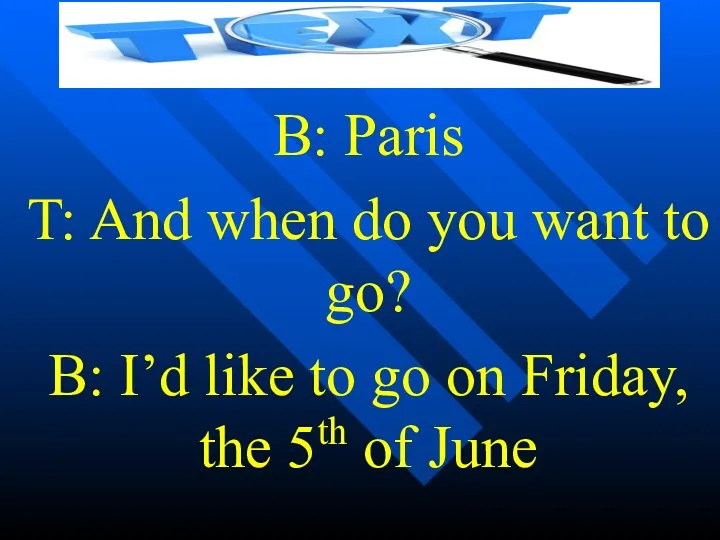
B: Paris
T: And when do you want to go?
B: I’d like
to go on Friday, the 5th of June
Слайд 205
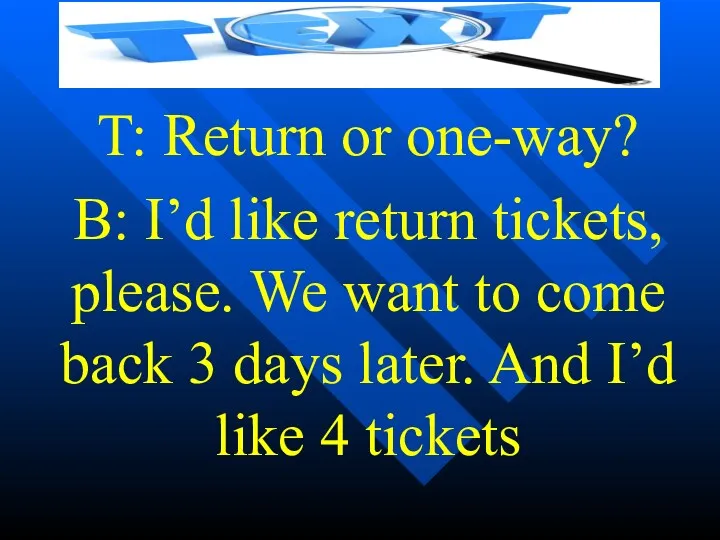
T: Return or one-way?
B: I’d like return tickets, please. We want
to come back 3 days later. And I’d like 4 tickets
Слайд 206
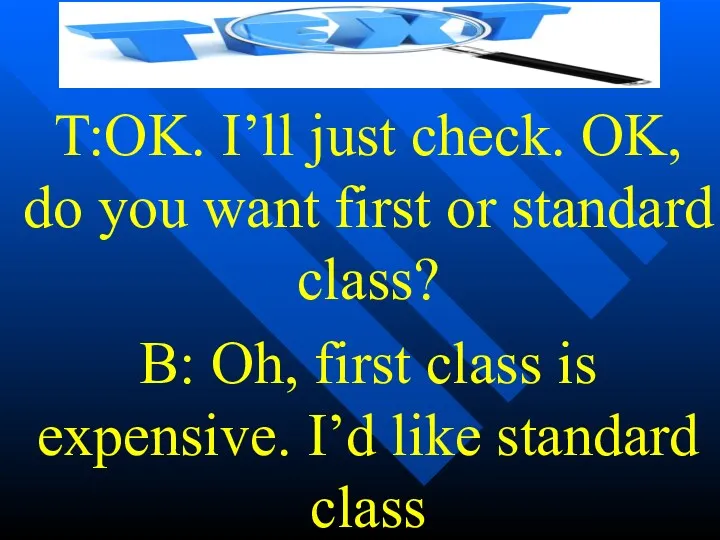
T:OK. I’ll just check. OK, do you want first or standard
class?
B: Oh, first class is expensive. I’d like standard class
Слайд 207
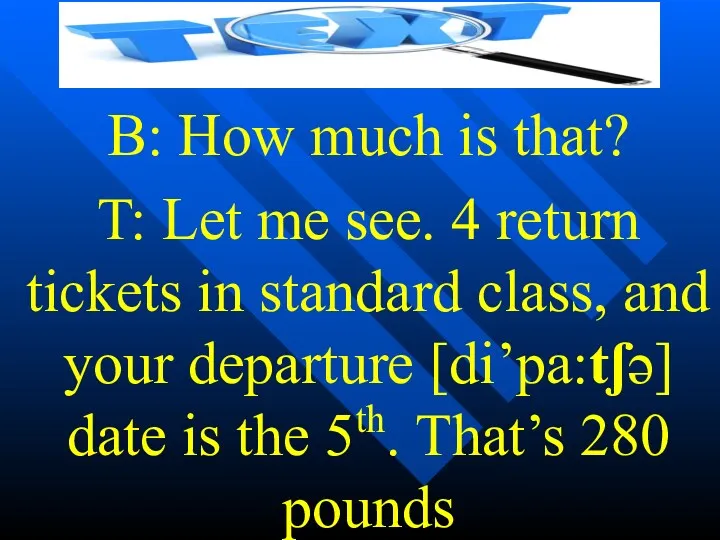
B: How much is that?
T: Let me see. 4 return tickets
in standard class, and your departure [di’pa:tʃə] date is the 5th. That’s 280 pounds
Слайд 208
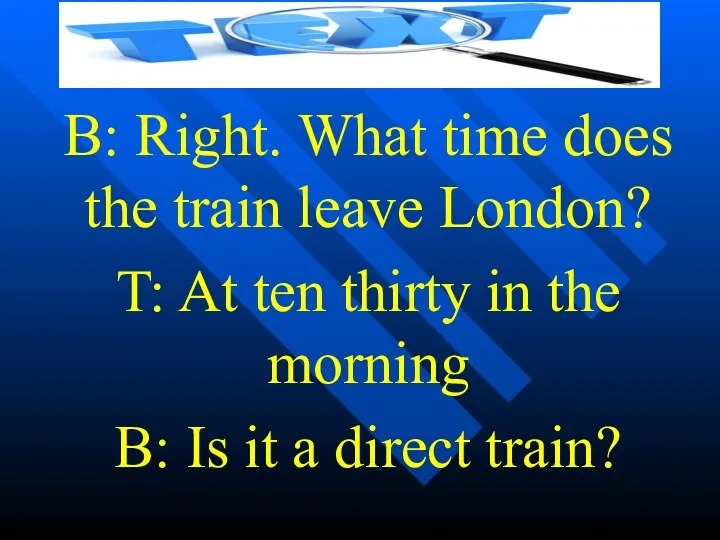
B: Right. What time does the train leave London?
T: At ten
thirty in the morning
B: Is it a direct train?
Слайд 209
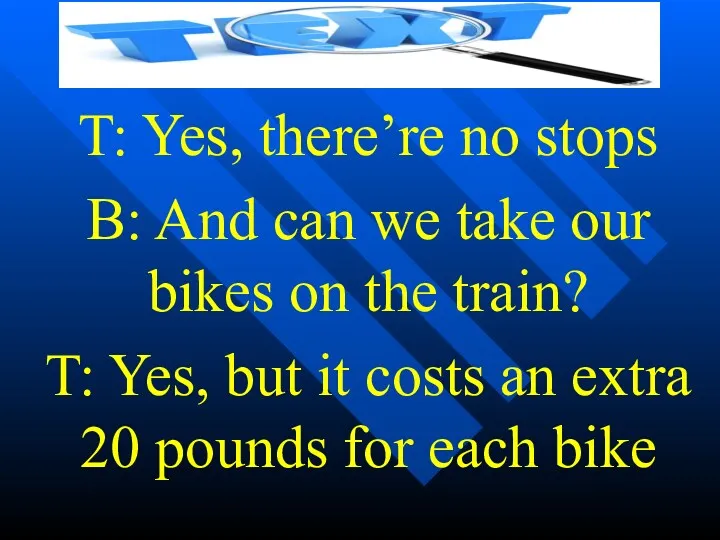
T: Yes, there’re no stops
B: And can we take our bikes
on the train?
T: Yes, but it costs an extra 20 pounds for each bike
Слайд 210
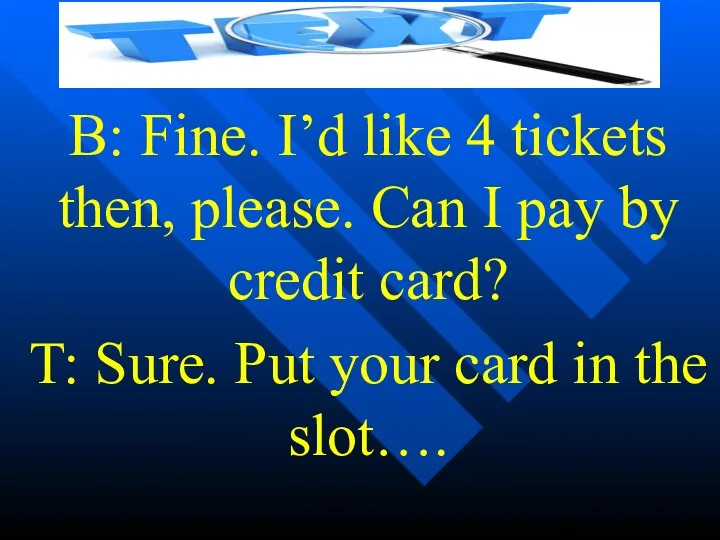
B: Fine. I’d like 4 tickets then, please. Can I pay
by credit card?
T: Sure. Put your card in the slot….
Слайд 211
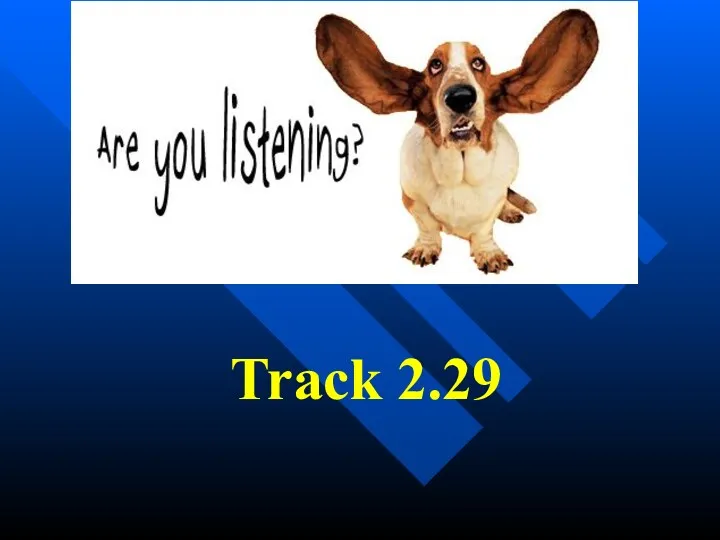
Слайд 212
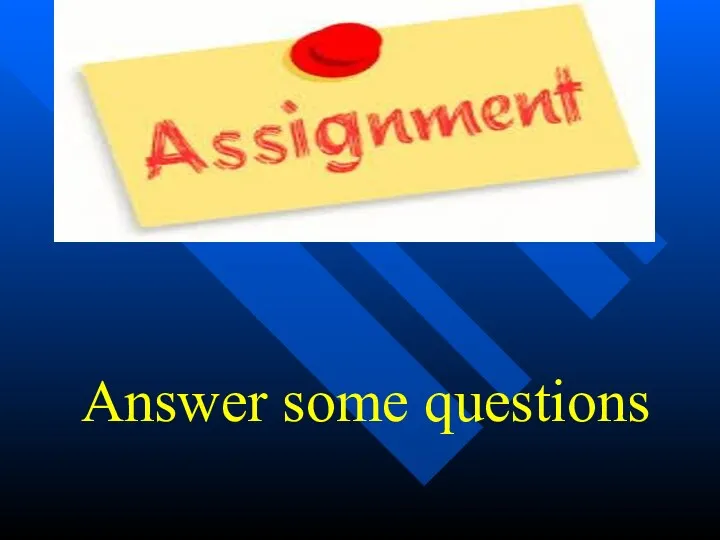
Слайд 213
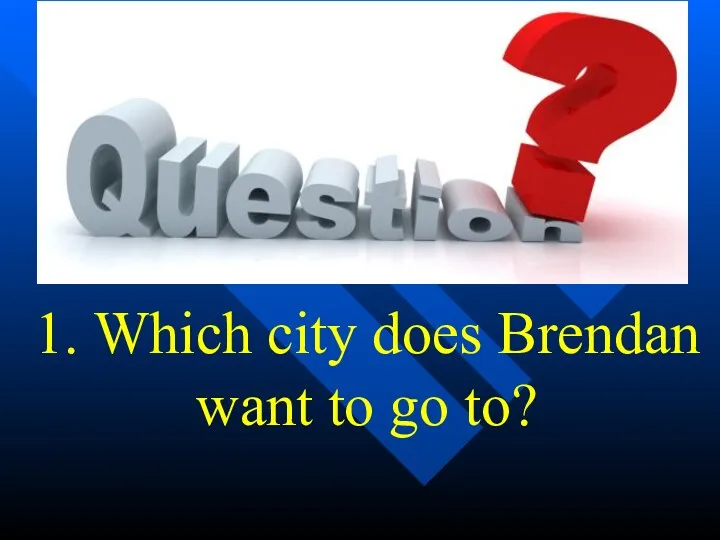
1. Which city does Brendan want to go to?
Слайд 214
![T: Yes. What’s your destination [desti’neʃən]? B: Paris](/_ipx/f_webp&q_80&fit_contain&s_1440x1080/imagesDir/jpg/581422/slide-213.jpg)
T: Yes. What’s your destination [desti’neʃən]?
B: Paris
Слайд 215
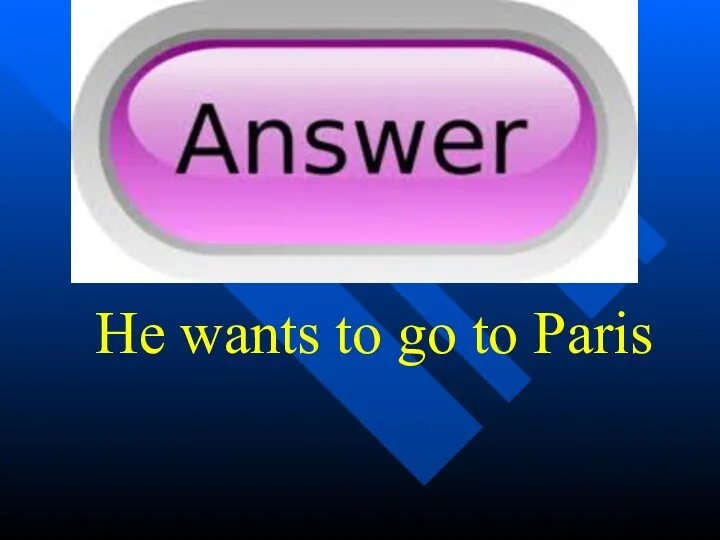
Слайд 216

2. When does he want to leave?
Слайд 217
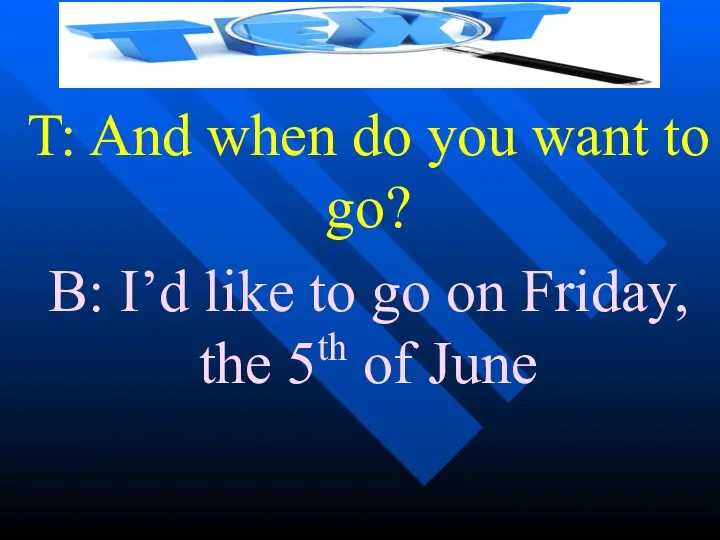
T: And when do you want to go?
B: I’d like to
go on Friday, the 5th of June
Слайд 218
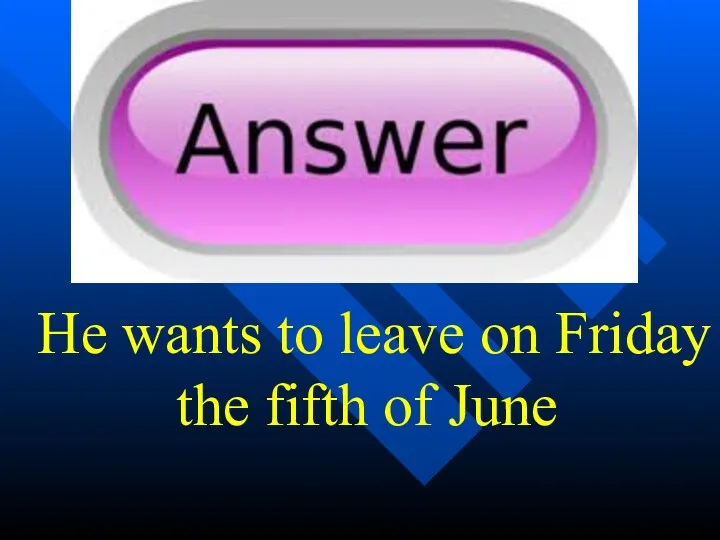
He wants to leave on Friday the fifth of June
Слайд 219
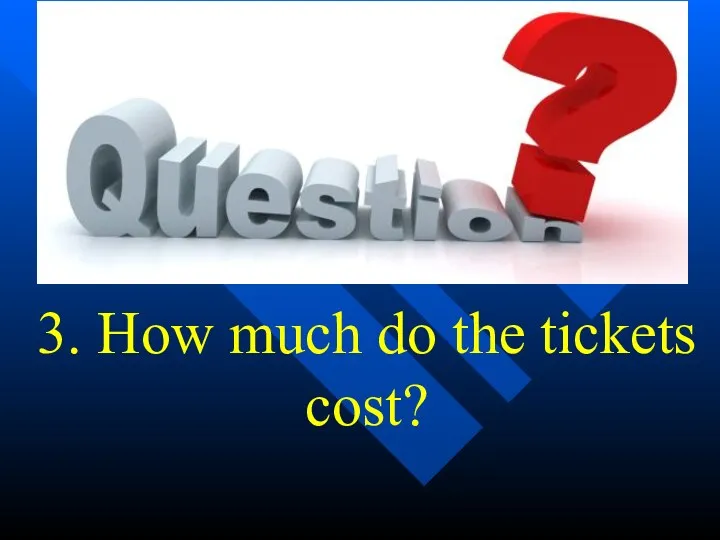
3. How much do the tickets cost?
Слайд 220
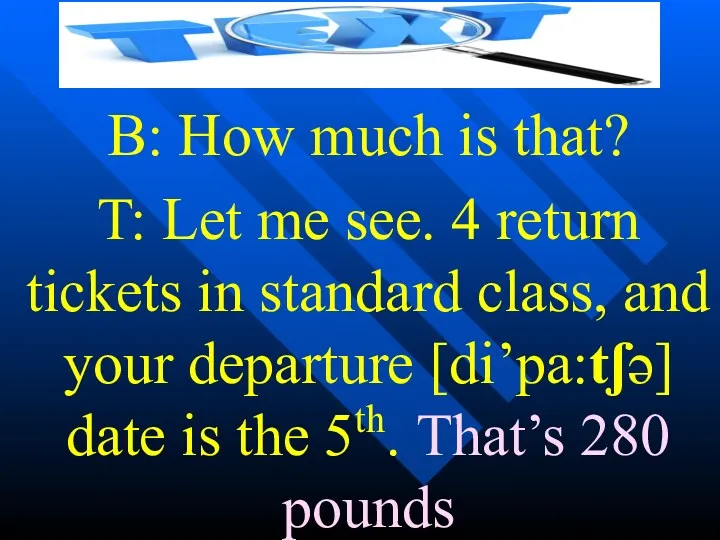
B: How much is that?
T: Let me see. 4 return tickets
in standard class, and your departure [di’pa:tʃə] date is the 5th. That’s 280 pounds
Слайд 221
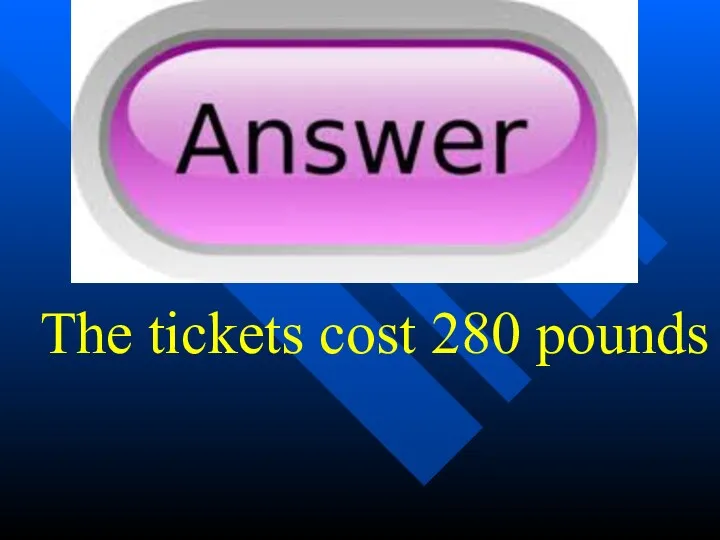
The tickets cost 280 pounds
Слайд 222
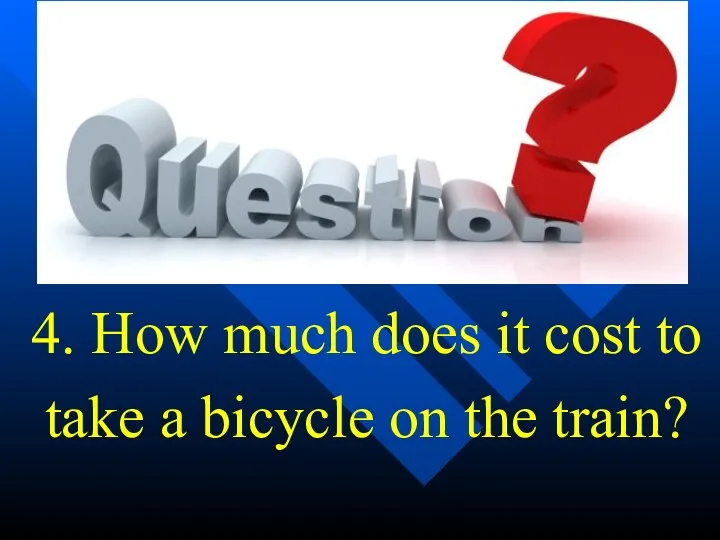
4. How much does it cost to
take a bicycle on the
train?
Слайд 223
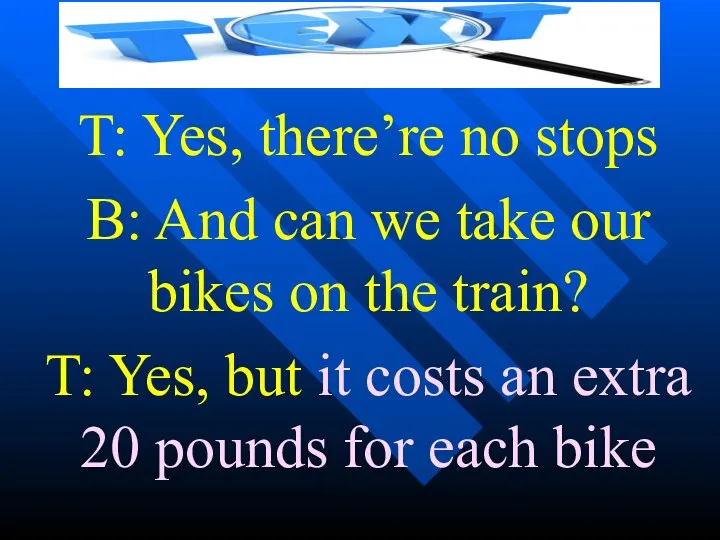
T: Yes, there’re no stops
B: And can we take our bikes
on the train?
T: Yes, but it costs an extra 20 pounds for each bike
Слайд 224
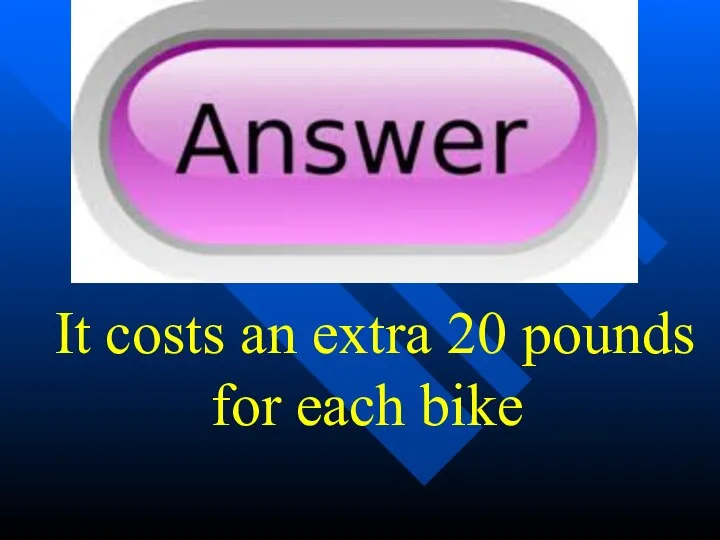
It costs an extra 20 pounds for each bike
Слайд 225
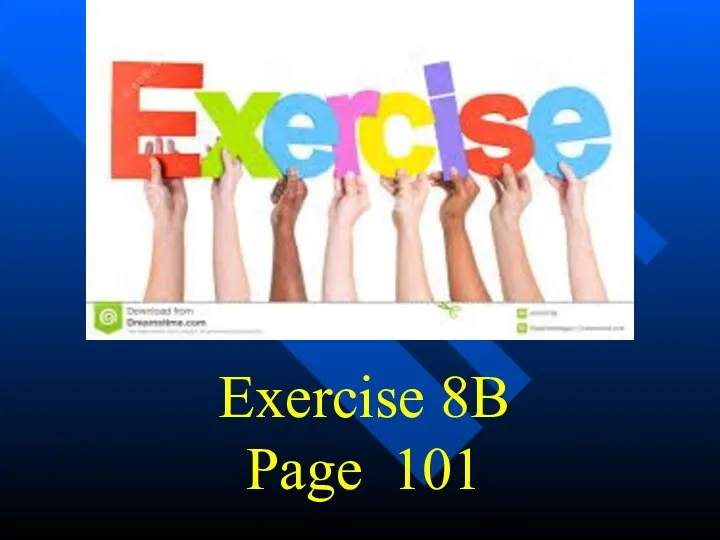
Слайд 226
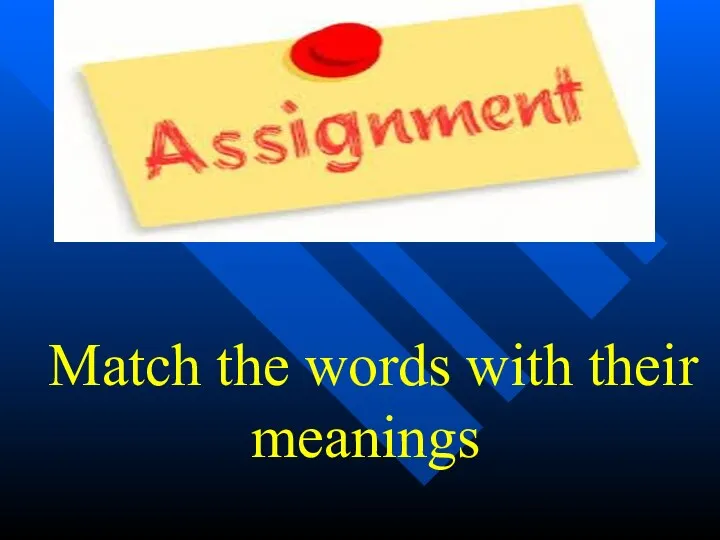
Match the words with their meanings
Слайд 227
![1. Destination [desti’neʃən]?](/_ipx/f_webp&q_80&fit_contain&s_1440x1080/imagesDir/jpg/581422/slide-226.jpg)
1. Destination [desti’neʃən]?
Слайд 228
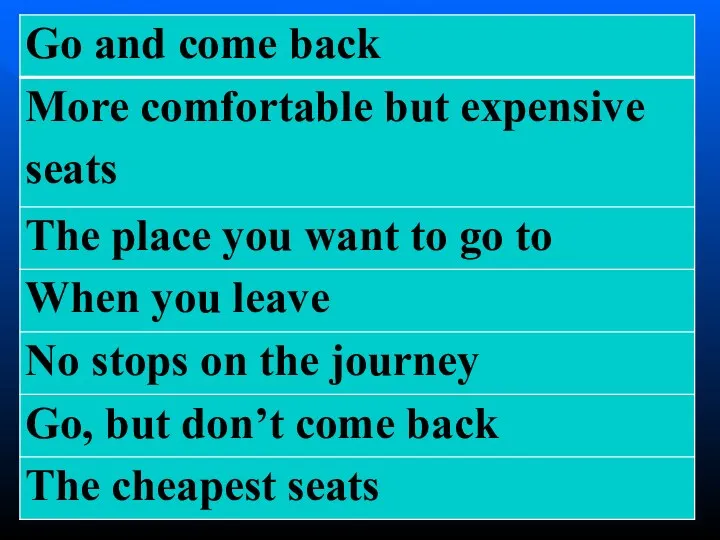
Слайд 229
![Destination [desti’neʃən] – the place you want to go to (c)](/_ipx/f_webp&q_80&fit_contain&s_1440x1080/imagesDir/jpg/581422/slide-228.jpg)
Destination [desti’neʃən] – the place you want to go to (c)
Слайд 230
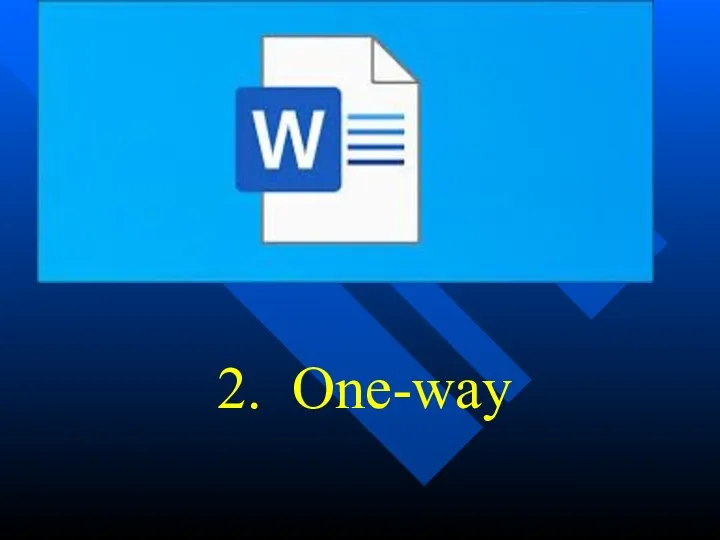
Слайд 231
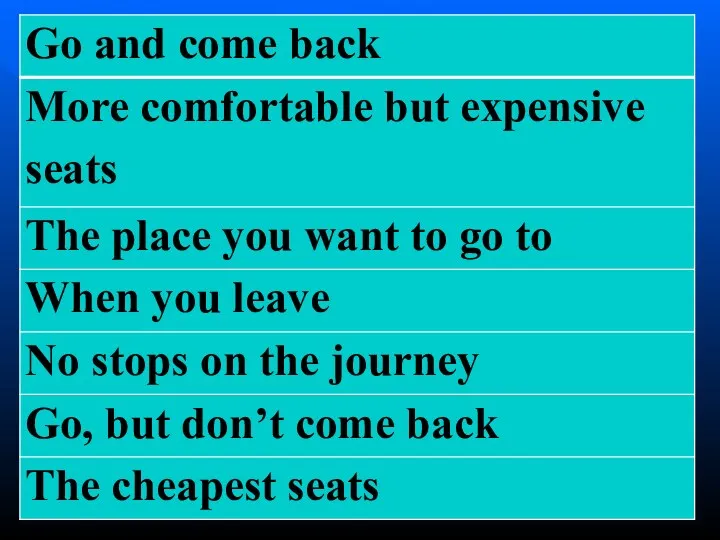
Слайд 232
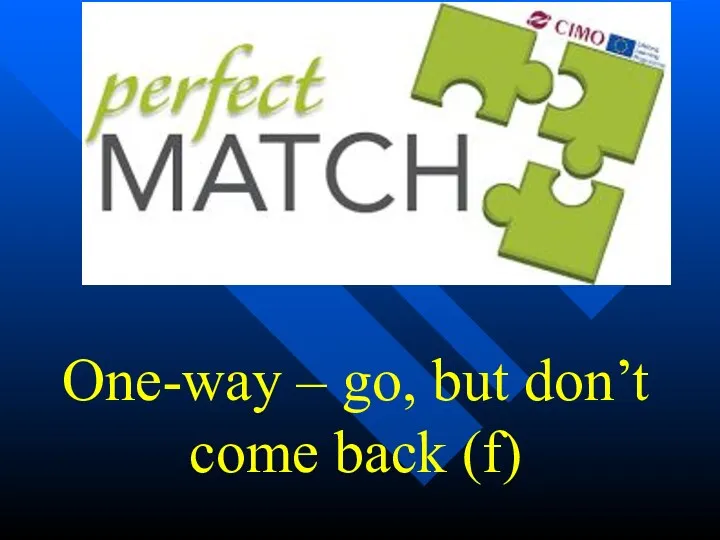
One-way – go, but don’t come back (f)
Слайд 233
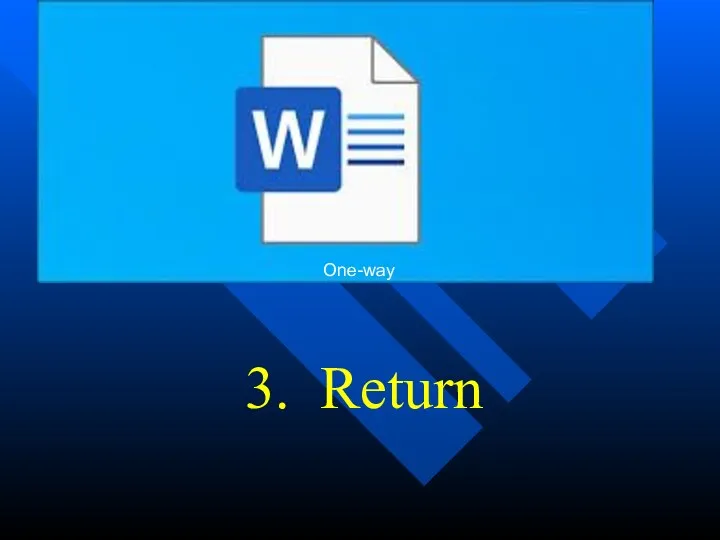
Слайд 234

Слайд 235

Return – go and come back (a)
Слайд 236
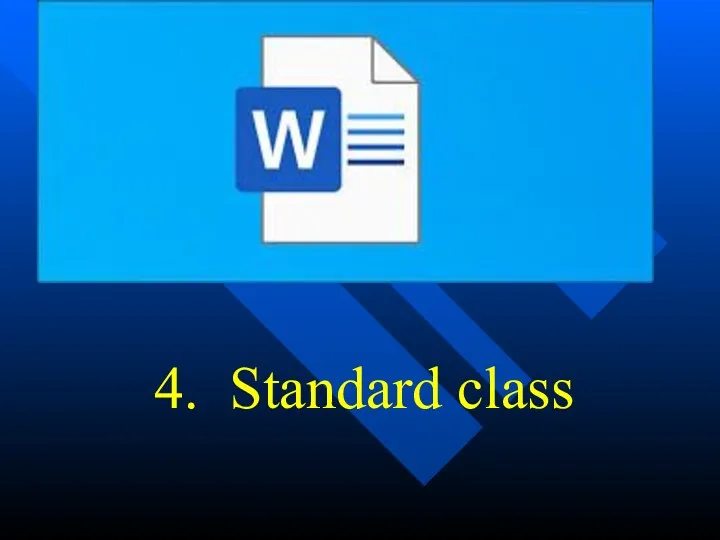
Слайд 237
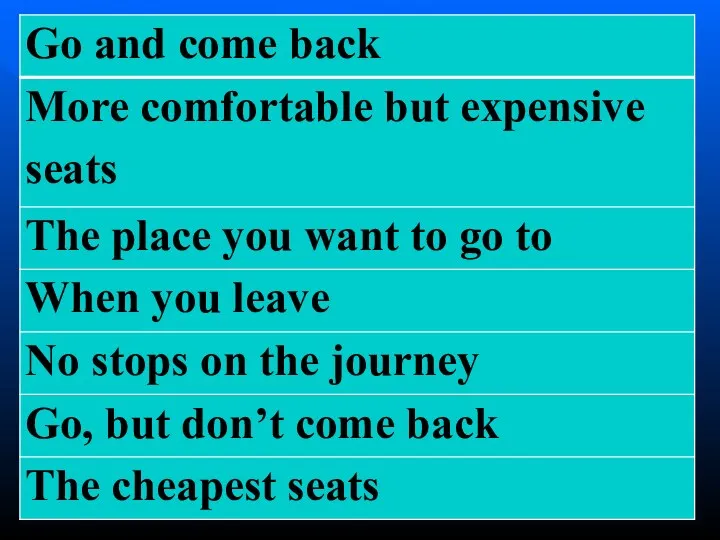
Слайд 238

Standard class – the cheapest seats (g)
Слайд 239
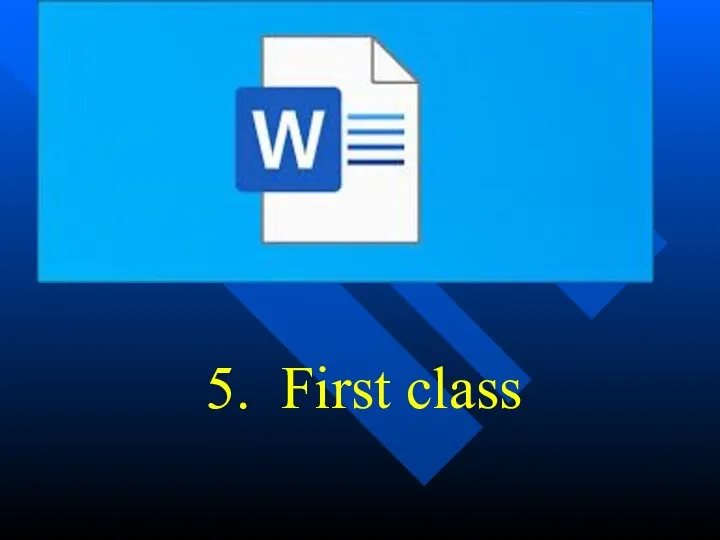
Слайд 240

Слайд 241
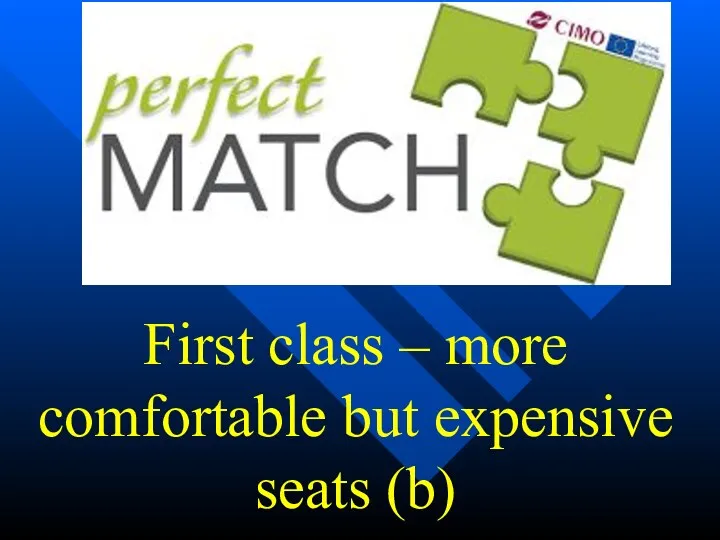
First class – more comfortable but expensive seats (b)
Слайд 242
![6. Deprture [di’pa:tʃə] (отправление)](/_ipx/f_webp&q_80&fit_contain&s_1440x1080/imagesDir/jpg/581422/slide-241.jpg)
6. Deprture [di’pa:tʃə] (отправление)
Слайд 243
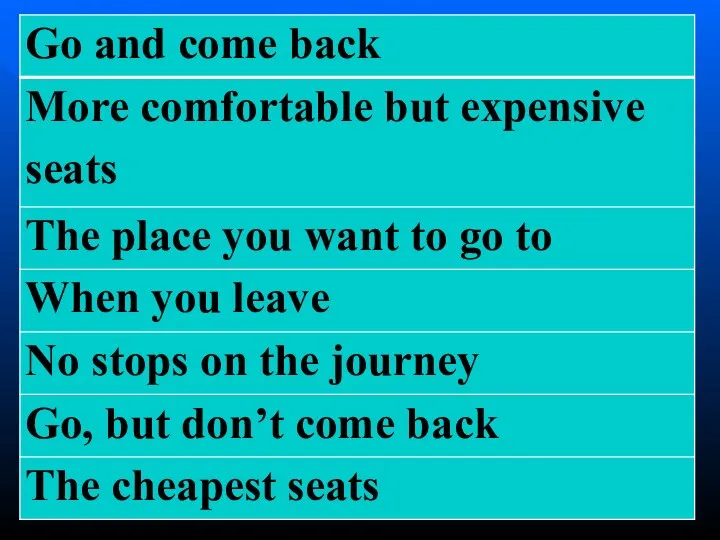
Слайд 244
![Departure [di’pa:tʃə] - when you leave (d)](/_ipx/f_webp&q_80&fit_contain&s_1440x1080/imagesDir/jpg/581422/slide-243.jpg)
Departure [di’pa:tʃə] - when you leave (d)
Слайд 245
![7. Direct [di’pa:tʃə]](/_ipx/f_webp&q_80&fit_contain&s_1440x1080/imagesDir/jpg/581422/slide-244.jpg)
Слайд 246
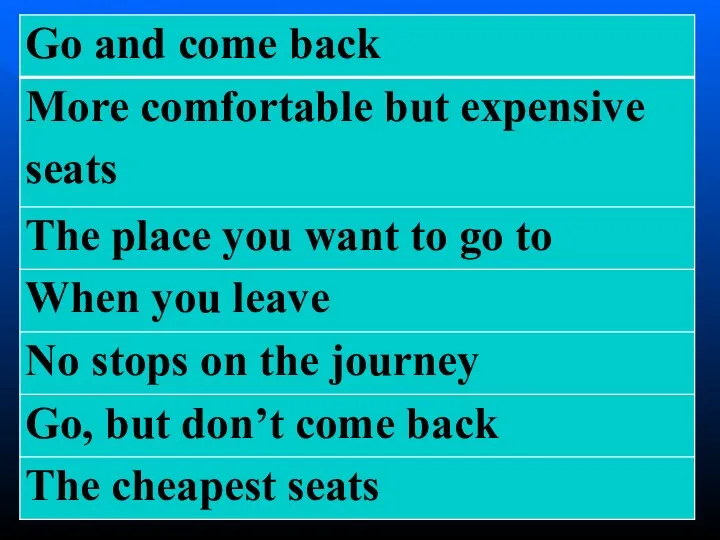
Слайд 247
![Direct – no stops on the journey [dʒɜːni]](/_ipx/f_webp&q_80&fit_contain&s_1440x1080/imagesDir/jpg/581422/slide-246.jpg)
Direct – no stops on the journey [dʒɜːni]
Слайд 248
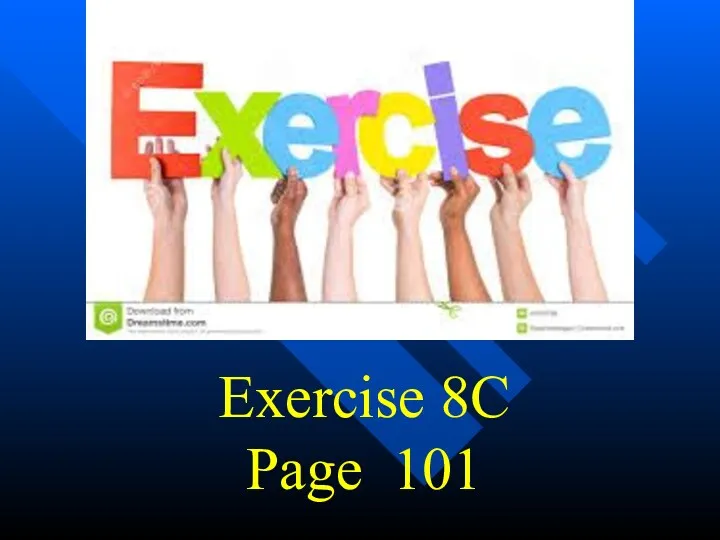
Слайд 249
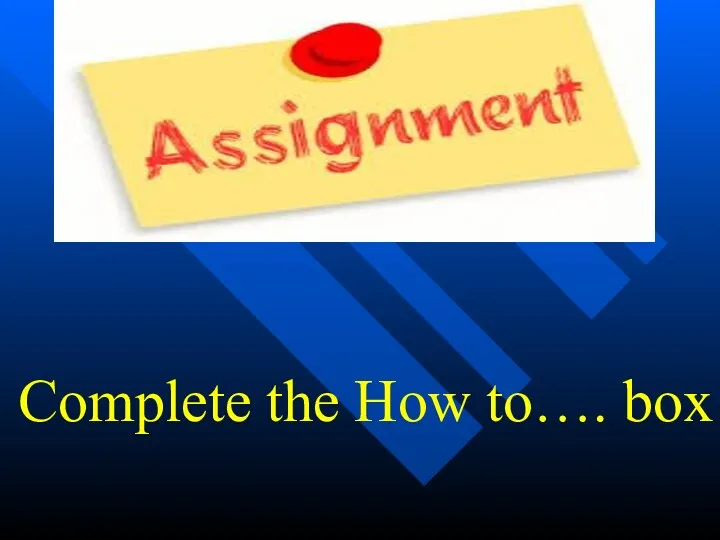
Complete the How to…. box
Слайд 250
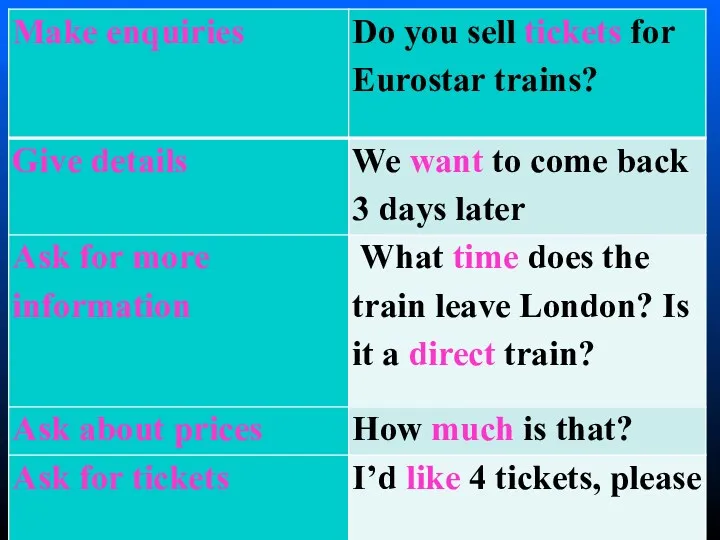
Слайд 251
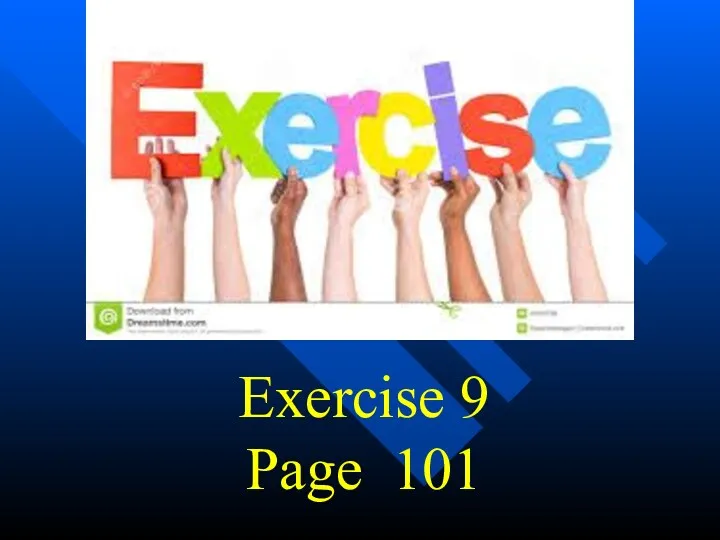
Слайд 252
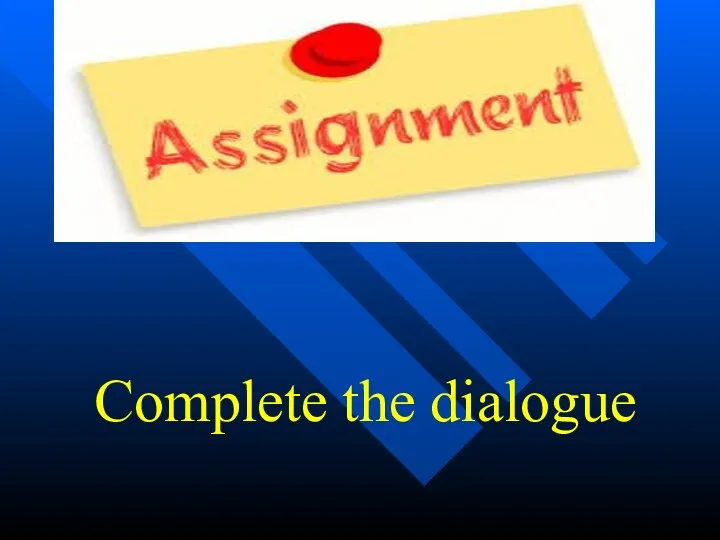
Слайд 253
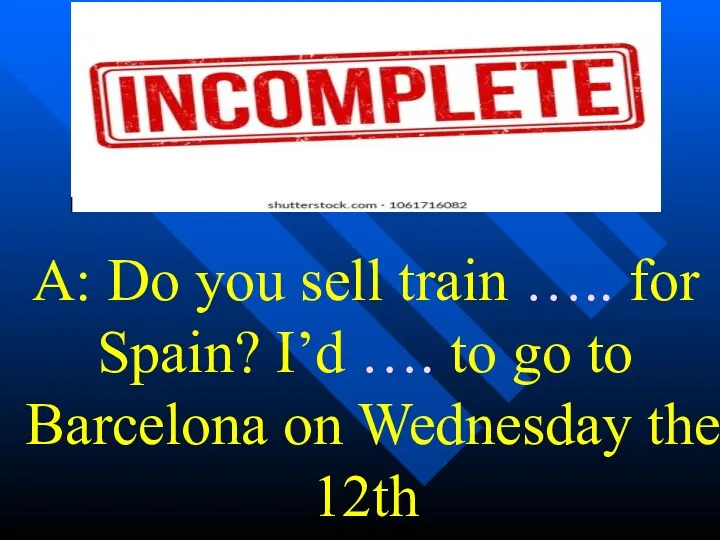
A: Do you sell train ….. for Spain? I’d …. to
go to Barcelona on Wednesday the 12th
Слайд 254
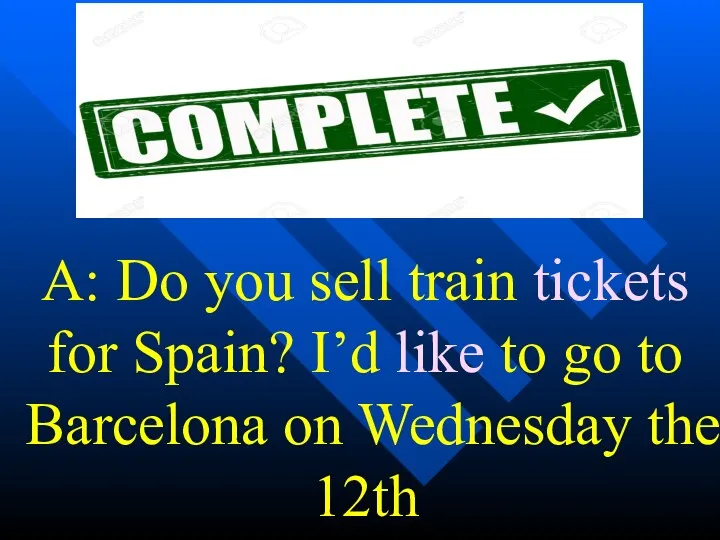
A: Do you sell train tickets for Spain? I’d like to
go to Barcelona on Wednesday the 12th
Слайд 255
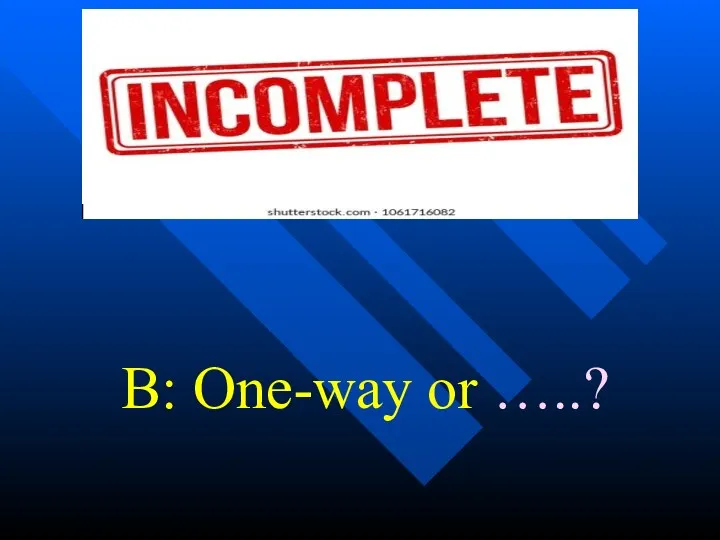
Слайд 256
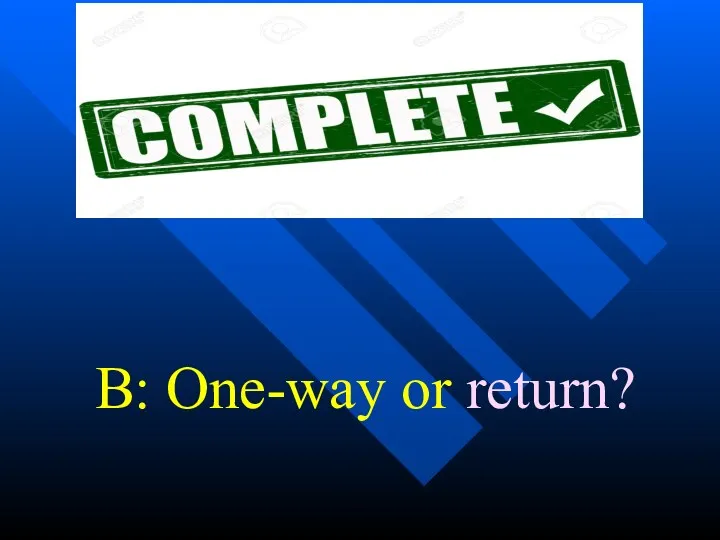
Слайд 257
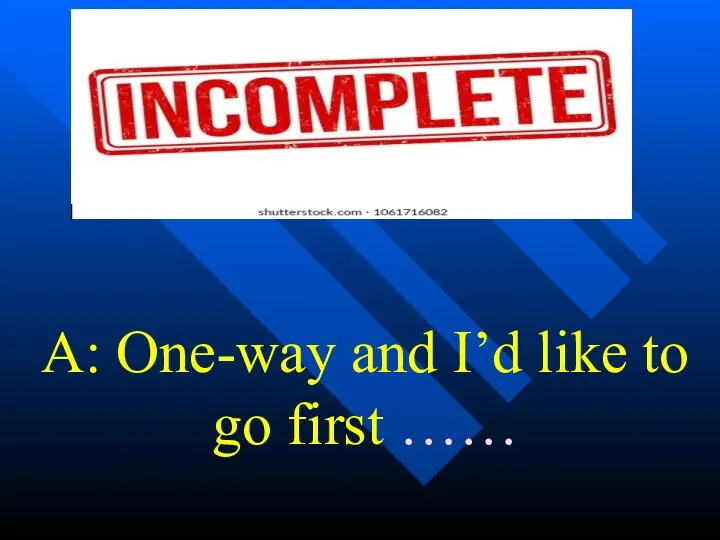
A: One-way and I’d like to go first ……
Слайд 258
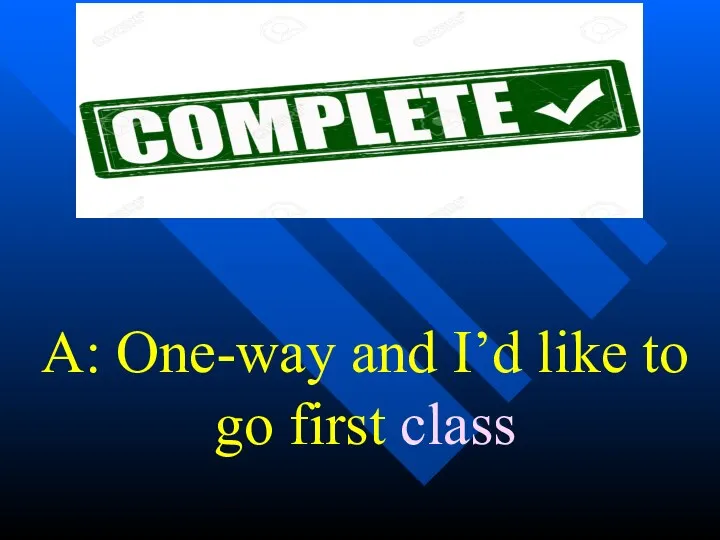
A: One-way and I’d like to go first class
Слайд 259
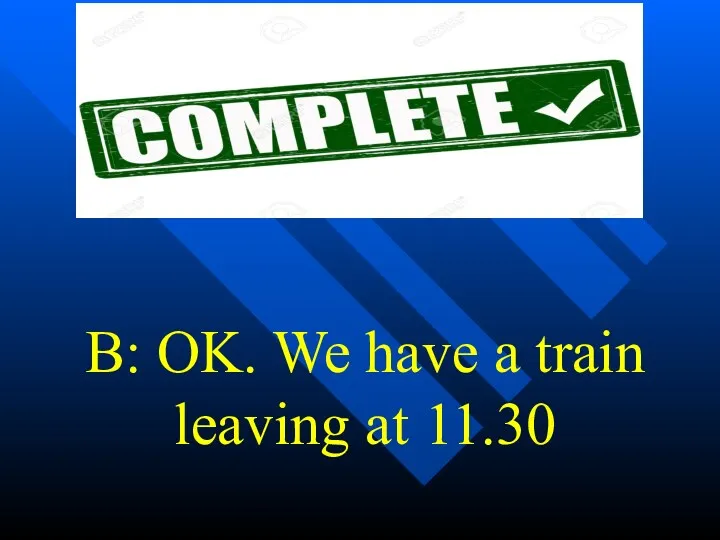
B: OK. We have a train leaving at 11.30
Слайд 260
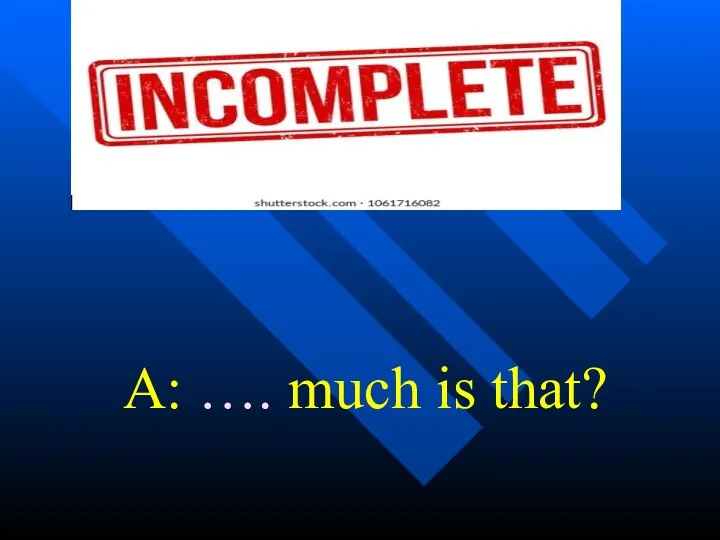
Слайд 261

Слайд 262

Слайд 263
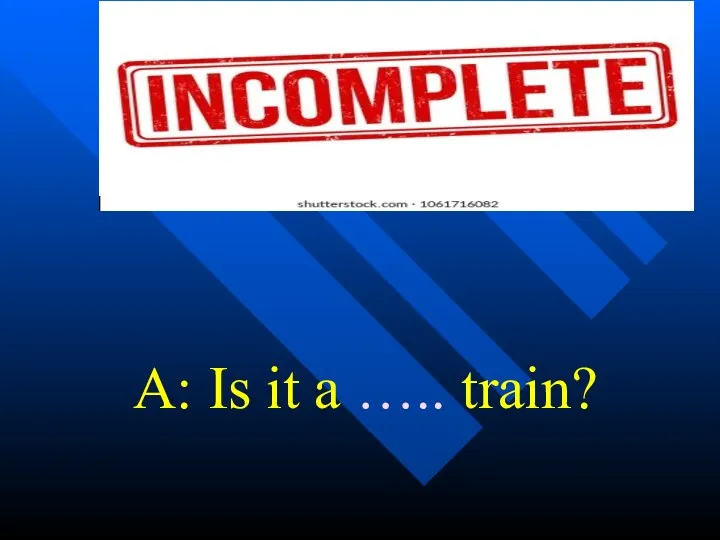
Слайд 264
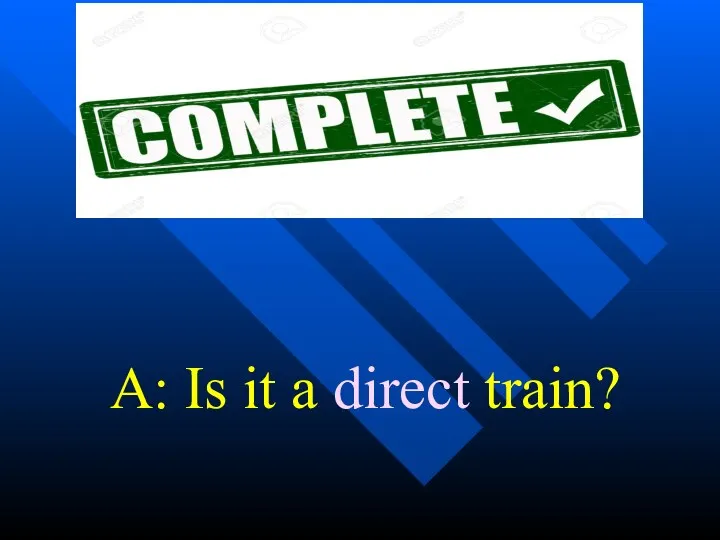
Слайд 265
![B: No, it stops in Lyons [li’on]](/_ipx/f_webp&q_80&fit_contain&s_1440x1080/imagesDir/jpg/581422/slide-264.jpg)
B: No, it stops in Lyons [li’on]
Слайд 266
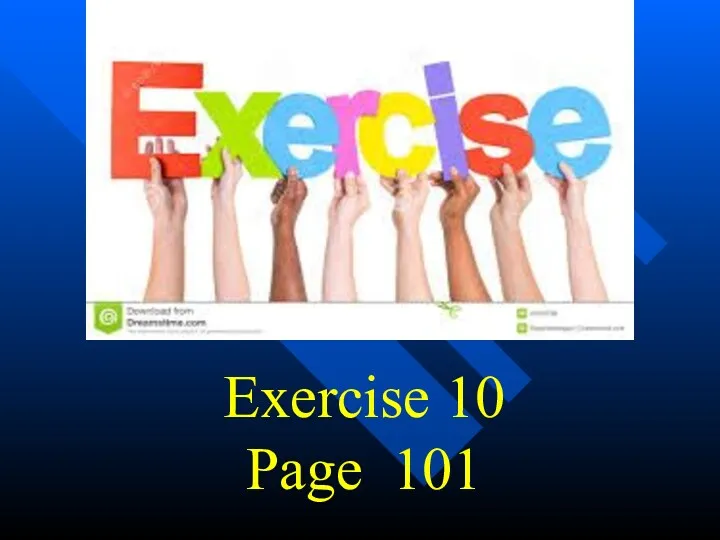
Слайд 267
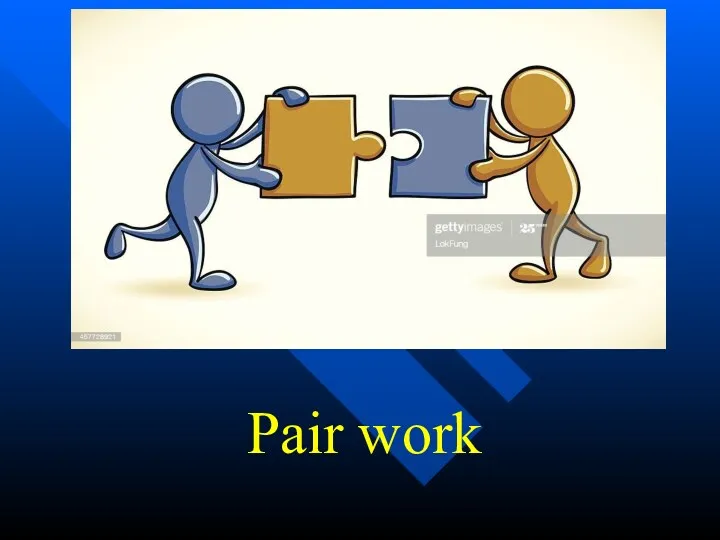
Слайд 268
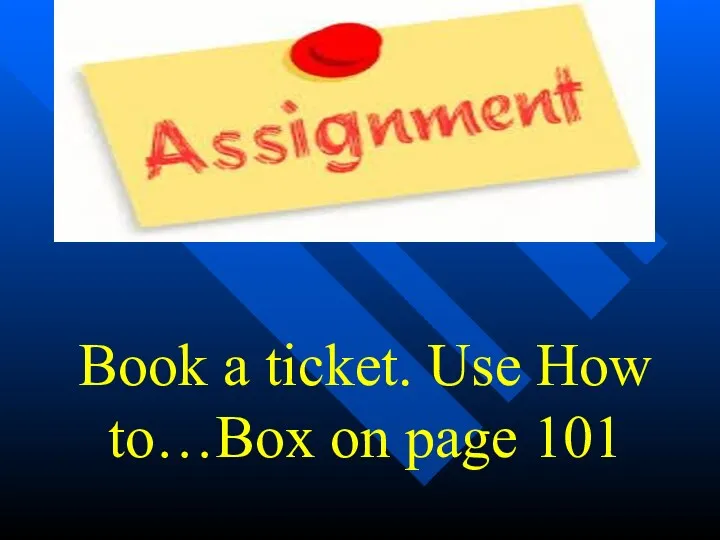
Book a ticket. Use How to…Box on page 101
![Cycle [saikl] – кататься на велосипеде](/_ipx/f_webp&q_80&fit_contain&s_1440x1080/imagesDir/jpg/581422/slide-1.jpg)
![Cycle [saikl] city - город велосипедов](/_ipx/f_webp&q_80&fit_contain&s_1440x1080/imagesDir/jpg/581422/slide-2.jpg)


![Suburb [sʌbɜːb]- пригород](/_ipx/f_webp&q_80&fit_contain&s_1440x1080/imagesDir/jpg/581422/slide-5.jpg)
![Commute [kə’mju:t]- ездить далеко на работу](/_ipx/f_webp&q_80&fit_contain&s_1440x1080/imagesDir/jpg/581422/slide-6.jpg)


![1. Commuting [kə’mju:tiŋ] – долгие поездки на работу](/_ipx/f_webp&q_80&fit_contain&s_1440x1080/imagesDir/jpg/581422/slide-9.jpg)

![Commuting [kə’mju:tiŋ] – travelling to work every day (b)](/_ipx/f_webp&q_80&fit_contain&s_1440x1080/imagesDir/jpg/581422/slide-11.jpg)
![2. Suburbs [sʌbɜːbz] – пригороды](/_ipx/f_webp&q_80&fit_contain&s_1440x1080/imagesDir/jpg/581422/slide-12.jpg)

![Suburbs [sʌbɜːbz] – places around the city where people live (с)](/_ipx/f_webp&q_80&fit_contain&s_1440x1080/imagesDir/jpg/581422/slide-14.jpg)



![4. Rush hour [auə]- час пик](/_ipx/f_webp&q_80&fit_contain&s_1440x1080/imagesDir/jpg/581422/slide-18.jpg)


![5. Crowded [kraudid]- переполненный](/_ipx/f_webp&q_80&fit_contain&s_1440x1080/imagesDir/jpg/581422/slide-21.jpg)
















![4. Commuting from the suburbs [sʌbɜːbz] into Tokyo](/_ipx/f_webp&q_80&fit_contain&s_1440x1080/imagesDir/jpg/581422/slide-38.jpg)


![4. Commuting from the suburbs [sʌbɜːbz] into Tokyo](/_ipx/f_webp&q_80&fit_contain&s_1440x1080/imagesDir/jpg/581422/slide-41.jpg)

![Bicycle [baisikl] Bike](/_ipx/f_webp&q_80&fit_contain&s_1440x1080/imagesDir/jpg/581422/slide-43.jpg)
























































































































































![Destination [desti’neʃən] – пункт назначения](/_ipx/f_webp&q_80&fit_contain&s_1440x1080/imagesDir/jpg/581422/slide-196.jpg)





![B: Good morning. Do you sell tickets for Eurostar trains? T: Yes. What’s your destination [desti’neʃən]?](/_ipx/f_webp&q_80&fit_contain&s_1440x1080/imagesDir/jpg/581422/slide-202.jpg)










![T: Yes. What’s your destination [desti’neʃən]? B: Paris](/_ipx/f_webp&q_80&fit_contain&s_1440x1080/imagesDir/jpg/581422/slide-213.jpg)












![1. Destination [desti’neʃən]?](/_ipx/f_webp&q_80&fit_contain&s_1440x1080/imagesDir/jpg/581422/slide-226.jpg)

![Destination [desti’neʃən] – the place you want to go to (c)](/_ipx/f_webp&q_80&fit_contain&s_1440x1080/imagesDir/jpg/581422/slide-228.jpg)












![6. Deprture [di’pa:tʃə] (отправление)](/_ipx/f_webp&q_80&fit_contain&s_1440x1080/imagesDir/jpg/581422/slide-241.jpg)

![Departure [di’pa:tʃə] - when you leave (d)](/_ipx/f_webp&q_80&fit_contain&s_1440x1080/imagesDir/jpg/581422/slide-243.jpg)
![7. Direct [di’pa:tʃə]](/_ipx/f_webp&q_80&fit_contain&s_1440x1080/imagesDir/jpg/581422/slide-244.jpg)

![Direct – no stops on the journey [dʒɜːni]](/_ipx/f_webp&q_80&fit_contain&s_1440x1080/imagesDir/jpg/581422/slide-246.jpg)

















![B: No, it stops in Lyons [li’on]](/_ipx/f_webp&q_80&fit_contain&s_1440x1080/imagesDir/jpg/581422/slide-264.jpg)



 Toys game (3)
Toys game (3) Времена группы perfect
Времена группы perfect I have, who has monster sight words. Game
I have, who has monster sight words. Game Модальные глаголы
Модальные глаголы Warm-up. Describe the picture
Warm-up. Describe the picture A smile controversy as a conflict of different cultures
A smile controversy as a conflict of different cultures Almaty is the largest city in Kazakhstan
Almaty is the largest city in Kazakhstan Jeopardy game revision present simple
Jeopardy game revision present simple Present Perfect VS Present Perfect Continuous
Present Perfect VS Present Perfect Continuous Socialist Republic of Vietnam
Socialist Republic of Vietnam Comparatives and superlatives
Comparatives and superlatives Lecture 10. Phraseological units
Lecture 10. Phraseological units Australia is a fascinating
Australia is a fascinating Electric guitar
Electric guitar Достопримечательности Лондона
Достопримечательности Лондона Past Continuous. Употребление
Past Continuous. Употребление Can / can’t
Can / can’t Jared Joseph Leto
Jared Joseph Leto Past Tenses
Past Tenses Present simple
Present simple Golovkin Gennady Gennadevich
Golovkin Gennady Gennadevich Differences in British and American English
Differences in British and American English Madrid. It is big and busy city in the center of spain
Madrid. It is big and busy city in the center of spain A system of courts of law for the administration of justice. (Unit 10)
A system of courts of law for the administration of justice. (Unit 10) Intellectual property “Know your rights”
Intellectual property “Know your rights” Continuous (progressive). Tenses 1
Continuous (progressive). Tenses 1 Introduction to sociology. Sociology as science
Introduction to sociology. Sociology as science Food and shopping
Food and shopping